The Lawmatics Blog
Insights on legal marketing, automating the law practice, and legal tech in general
Law firms spend a lot of time on the same three problems: getting the right information from new leads, quickly signing prospects after they’ve been qualified, and knowing which marketing dollars are actually paying off. In this session, Product Manager Devon Butler and Account Management Lead Clare Struzzi walk through new and upcoming Lawmatics features that address each of those challenges, from QualifyAI lead evaluation to e-signature packets and upcoming Meta Ads tracking.
Time stamps of key takeaways
7:15 – Send one link for forms, signatures, and payment
16:13 – Add automation around packet completion
24:03 – Set up QualifyAI agents by practice area
31:25 – See the “why” behind each QualifyAI recommendation
45:11 – Track Meta Ads spend and leads automatically
Webinar slide deck
Lawmatics CEO Matt Spiegel recently joined the Legal MastermindPodcast, hosted by Ryan Klein and Chase Williams. They discussed the history and culture of Lawmatics, and the everyday legal problems that led to its founding.
The founder's journey
Matt’s arc from practicing criminal defense attorney to serial legal tech entrepreneur is an unusual one. He dives into how his experiences have led him to founding the #1 CRM and automation platform for law firms, including:
- How a bar complaint led to Matt becoming an entrepreneur
- His path from MyCase, to venturing outside legal tech, to Lawmatics
Inside Lawmatics
Ryan and Chase ask about the things that make Lawmatics stand out from the pack.
- The values and culture that make Lawmatics one of the best places to work
- Growth goals for Lawmatics this year
Stay tuned for some insights on how technology like AI and predictive analytics will shape the legal landscape. Listen to the audio player above, or read the transcript below.
Podcast transcript
Matt Spiegel:Our culture is everything to us. One of the things that we've been very fortunate is everyone's getting rid of offices, we just moved from 4,000 square feet to 12,500 square feet. We more than tripled the size of our office because people are coming in. We have this amazing culture. That's the part that I'm most proud of. It's what makes me get up every day is the team that we've built.Speaker 2:You're listening to the Legal Mastermind podcast with your host, Ryan Klein and Chase Williams, the go-to podcast for learning from the experts in the legal community about effective ways to grow and manage your law firmChase Williams:Today, on the Legal Mastermind podcast, we have Matt Spiegel. He's the founder and CEO of Lawmatics. He actually founded another company you might be familiar with called My Case and back in the day he started off as a lawyer and so there's lots to talk about today, Matt. So welcome to the Legal Mastermind podcast.Matt Spiegel:Yeah, thank you guys for having me. Super excited for the conversation today.Chase Williams:For sure. And we were riffing so hard beforehand just about one, how your experience was wake surfing for the first time with the CEO of Clio and how fun that was. And then just started talking about you were a lawyer and you found a need, I assume for your firm, which we'll talk about in a minute. And then you started my case and then you're one of the few entrepreneurs that I've ever spoken to that's found two successful tech companies or SaaS products. That's where I guess the sexy slogan would be for what you guys do.Matt Spiegel:I guess. Yeah.Chase Williams:So how did that story start? I mean, you graduated law school and then worked for an attorney's office for a couple years and then started your own firm. So take us from starting the firm to your first-Matt Spiegel:That's right. I mean, I guess it goes back earlier than that too because I don't really think I ever wanted to be a lawyer if I really think about it. I think I just wanted to own a business and I guess somewhere in my... Well, parents actually made me go to law school. This is my senior year of college and I'm getting ready to go on spring break. I'm sitting at home and I'm leaving the next day for this awesome spring break trip senior year, which is the most epic year. And they're like, we don't want you to go into real estate. You need to go to law school. And that was literally the first I ever thought about it. And this was March of my senior year of college. And so I kind of shotgun took the LSAT and then went to law school.So it's not like I ever was like, oh my God, I have this dream of being a lawyer. It definitely was not romantic for me, but I thought it could be a good business to run. And then during law school I decided that of all the types of law firms to have, criminal defense would probably be the easiest to run a business. I could build a repeatable process. I think I could advertise and actually attract customers. So basically I thought that I could start a law firm without much experience and probably get people in the door.So after law school, I ended up going and working for a kind of notorious firm in San Diego for four years. Really, really high volume criminal defense practice. And then I had enough experience, I had helped hundreds of clients at that point. And so I'm like, all right, time to do my own thing. So I left to do my own thing and within two weeks I think I got a bar complaint. And so what was funny was that bar complaint is ultimately what led me down this whole road. So if it wasn't for that bar complaint, I probably would not be here talking to you guys. I would not have started My Case and then certainly would not have started on with Lawmatics.Chase Williams:I'm surprised you didn't start your own AVO competitor since you had that great AVO score after that bar complaint, I'm sure.Matt Spiegel:Well, you want to talk about AVO, that's a whole different story. We can talk about that. Because somehow, as I make the money sign, I maintained my 10.0 score. But no, it was a complaint about client communication. Basically they were just like, my lawyer didn't call me back quick enough. So I started thinking, I'm like, how do I... This guy called me at like 9:00 in the morning and I called him back at six. And that wasn't quick enough for him. But I was in court all day. I'm a criminal defense lawyer. I'm in trial. I can't answer the phone when I'm in judge's chambers or when I'm talking to a jury. I got back to him as quick as I could and I have other clients and I started hearing the same thing from other clients, although they didn't make bar complaints. And the issue, it's not like they had something critically important to talk to me about. They wanted to know when was their next court date and where's my police report? I want to see my police report.These are two very basic things that if I could just provide them with that information, they wouldn't need to call me all the time. And so I'm like, well, wait a second, can't I just add this to my website so that my clients can log in and they could just see their calendar. I could upload their court documentation and police report. And so my cousin who was building my website, he was just a basic website builder. I'm like, "Dude, can you build something on the back end of my site so that my clients could get this stuff?" And he's like, "I mean, I can try." He's like, "I have no idea how to do that though." So we kind of hacked it together and I'm talking to my friends and my friends are like, hey, can you build that for us? I'm like, no.Chase Williams:Was there anything out there that was similar to-Matt Spiegel:No. So we were using a couple products. I think I was using Clio at the time. I also had tried Rocket Matter and those are brand new, just online practice management solutions for billing and stuff like that. But they really didn't have any sort of client... There was no client portal. That wasn't a thing really. And so I hired on a buddy to come basically found My Case with me alongside of my cousin and I'm like, hey, you're an engineer. Can you build this? I think other lawyers would want this portal. And so we invented the client portal and that's all that My Case was. And we were like, other lawyers are going to want this. And we started trying to show other lawyers and other lawyers were like, hey, this is really cool, but we don't want to use it on its own. It needs to be part of this big solution. And so we went back and we just built our own practice management system and that's how My Case got started.Chase Williams:How long did it take?Matt Spiegel:I mean, it's never done. My Case just sold to LawPay. Big transaction worth a billion dollars now. And it's still not done. The software is never finished, but it took like six months to build a version that we could go out to people with, really a year before we really went to market. And then it was a year and a half later that we had grown pretty big and we sold to a company called AppFolio. So it was a pretty quick run before acquisition. And then I stayed with that company for years after that still running My Case. But I did it alongside. I mean, I started my law firm in 2009. I had the idea for My Case at the very end of 2009. Also had my first kid or found out that we were pregnant with our first kid right in there too. Just a whirlwind. And then I still had my law firm. My law firm was just getting started. So the first year and a half, almost two years of building My Case, I also had my law firm. It was crazy.Ryan Klein:The story about your cousin building the website, it sounds like when Chase and I were starting an agency, we'd be pitching lawyers and at the end of the day they'd be like, you know what? My cousin's just going to build the website, he's going to get me a deal. So maybe we were talking to you for all we know back in the day. So when you're going through this process, and obviously you're a busy lawyer and you're kind of assembling this dream team to launch this new software, how are you coordinating it? Were you essentially leading it or someone else or are you arranging for time on weekends or late evenings?Matt Spiegel:Yeah. No, I mean that was the trick was I had this law firm and the law firm was... I was having a kid, a law firm is what's putting food on the table and a roof over our head. This pie in the sky idea of building a software company, it's just a dream at that point. I had like four offices in my law firm and one of the offices was my cousin and my other co-founder who were working on building My Case. And so everyone was just sort of moonlighting. It was one of those things where it's like, you have this idea, you have something that you think could be really cool, but everyone needs to work. Everyone needs to still make money. And we weren't raising millions of dollars from a venture capital at that point, things like that. It's a side hustle. It was totally a side hustle at that point. And what we really figured out how to do was to leverage the law firm to help us build My Case.One of the biggest things, one of the toughest things was creating conviction amongst my co-founders that this was worth it. That was the first hurdle was like, you're going to do something like this where everyone's going to work on nights and weekends, they're going to give up a lot of their life in order to do this. And unfortunately, I couldn't really code, so there wasn't all that much for me to do. I can sit alongside of them and watch them do it, but at the end of the day, in the beginning, the early days, it's really all them writing code. You've got to convince them that this is worth it. And I think doing that was a bit of a challenge, and so we ended up just trying to figure out ways to make it fun. When you're doing a side hustle like that, I feel like you've got to make it fun. It can't feel like work.Chase Williams:Was there a point where you built it out and you would try to go to market and you're just like, man, nobody wants this. Did we waste our time? Did you have that feeling or were you pretty much like, this is going to work, no doubts.Matt Spiegel:I'm a super competitive guy. I think you kind of have to be competitive if you're in this world. And so losing was never really an option for me. But when we went to market, we went to this conference, this is going to date me I guess a little bit, but there was a legal... There's a big conference in New York called Legal Week. It used to be called Legal Tech, and they used to have one on the West Coast, they used to have one in LA. So this was like 2010. And we took the My Case client portal, we took it there and that's where we got the feedback from people like we're not going to use this. We might use it if it's part of a bigger practice management system, which could be cool, but we're not going to use it. And that was a moment where it was like, these guys had built this thing and I told them that other lawyers were going to want this, and now other lawyers are telling us that they're not going to use it.And so it's a little bit of a challenge I think at that point for myself too to sort of regroup and be like, guys, now I'm saying that we need to go and build this massive product. This was something pretty easy to build, this client portal, but now we need to go build something really big and this is going to take a lot of time and a lot of effort. And rallying behind a negative experience because being told that no one's going to use your product is a negative experience, rallying around that was definitely... We did it over a lot of beers, that's for sure.Chase Williams:Were you guys all at the conference hearing this news or was it just you and then you had to relay?Matt Spiegel:No, no, no. We were all there. We were all experiencing it. And I think what's cool is that lawyers were really great at this point. The feedback was, yeah, we're not going to use it, but it was like, we want to. We want to use it, you've just got to give it to us alongside of other tools because we just don't want this other thing that we have to use.Ryan Klein:Yeah, that's true. I mean, even today it's hard enough to get anyone to adopt one piece of technology. We have people that you could talk until you're blue in the face about the benefits of implementing this and showing the before and after, like you're using Excel spreadsheets or PDFs or handwriting things and this technology is going to solve it, but it's just going to take a little bit of dedication in the beginning, and they won't do it. So I can imagine 10 years ago.Matt Spiegel:Yeah, I mean, look at what's going on in the market right now, right? The idea of all in one solutions is still prominent, it's still what a lot of companies, big companies out there, Clio, My Case, File Vine, Smokeball, RocketLink, these companies are all trying to sort of strive for that all in one field. It's still the mentality and it was very much the mentality back then.Ryan Klein:So how do you get people to really start adopting new technology and giving it a shot, especially when law firms especially can be so averse? Did you have a breakthrough moment or have to do some sort of clever positioning?Matt Spiegel:No, I mean, I think at that point my strategy has always been very simple and it is just always listen to the customer, never listen to me basically. I'm a product junkie. At my companies where I spend most of my day to day beyond just basic CEO duties is in product. That's where I focus my time. And I made the mistake early on of building what I thought lawyers... I was a lawyer, so I was building stuff and maybe very early on that worked to build stuff that would basically scratch my own itch. But as we started to build and put a product out to market, you realize you cannot do that. You just have to listen to what your customers are telling you. And if you let your customers drive you and drive your product roadmap, it's been very successful for us.So that's where, to me, the breakthrough moment is really just deciding that we're going to listen 100% to our customers. And honestly as a law firm, you kind of should do the same thing. Our discussion today is really fun and may seem completely unrelated to law firms, but I actually think it's very related to law firms too. If you're treating your law firm like a startup, you're building this business, it's not just about how you practice law, it's also about the service that you provide and the experience that you provide and you need to listen to your customers in order to figure out how to make your experience better. And so when we started doing that as a product department at our company at My Case, and we've done that since day one at Lawmatics, that's when we really saw, okay, now lawyers, they're very happy to adopt our technology because we're building stuff that they are telling us to build.Chase Williams:So I assume you received some success at My Case and then it got to a point where you sold the company. So what happened next? You worked for the company some more I believe you said, and then you exited at one point.Matt Spiegel:Yeah, so we exited. I sold the company in 2012 and it was a great experience. I loved the company that we sold it to. We IPOed in 2015 and then that's when I left. So I was there about three years, almost three years after the acquisition, and incredible experience. And then I ended up going and messing around for a little while. I got brought on to a totally non-legal tech company. It's actually owned by a guy in Australia who owns a lot of legal tech companies, but I wasn't allowed to go work for a legal tech company at that time. So I went and worked for his non-legal tech company. I ended up taking that company over as CEO for a couple years and I was going back and forth to Sydney, Australia all the time, which was cool in the beginning, and then at that point now I had two little girls, and so traveling over there for a couple weeks at a time every two months got to be a lot.And honestly, I was the CEO, but I was still working for somebody. I had a chairman and I decided I needed my own thing again. I wanted to build my own company and be able to control the product, build a software product because the company I was working for was not really a software company. And then Lawmatics was what happened. We really saw this need in the market. We identified this need for our CRM back at My Case in 2014, and then in 2017 when I was going to start another company and we're like, man, this is still this massive hole in the market. And so we set out to solve it.Chase Williams:So I bet your experience starting Lawmatics was a little bit different. Did you call your cousin again or how did that work?Matt Spiegel:No, definitely did not call my cousin. My cousins was off doing other things, enjoying life a little bit more. I had another engineer who was working with me at My Case who I had brought along to my companies that I had done after I left My Case. And so I brought him on to kind of be our founding CTO. The beauty is this time around, one thing that I realized is I had a lot more access to great people the second time, and so I was able to build a team around me. Also had a little bit more access to capital the second time around, so I was able to build a little bit of a bigger team earlier on to go and build this thing. Lawmatics is a freaking beast, I mean, we've been building this thing for five years and we're just getting started. It is a massive piece of product. And so it took a while to build something that we could really be comfortable going to market with that had some product market fit.And then it's just been a wild ride ever since and much different path though, whereas My Case, we never really raised money for it. We sort of built it as a side hustle and then ended up getting acquired pretty early on. We're two or three rounds into venture funding now. We've raised almost $20 million, built a big company and been doing it for five years and are really pushing hard down the path of doing it ourselves without hitching our wagon to anybody. It's a very different approach.Ryan Klein:What do you think is different about your day-to-day leading this versus My Case? Is the day comprised of different responsibilities and types of meetings?Matt Spiegel:Totally. It couldn't be any different. When the company gets to a certain size, your day-to-day as a CEO becomes about the people and not about the product. My issues are managing people and people problems and not as much the product. I try to focus as much time on the product as I can, but we have a big team and that big team requires lots of different attention points, whether it's career path and promotions or hiring, firing, performance. All that becomes really important at a company our size. And that's a big difference. And in My Case, when we sold My Case, it was me and two other people, well technically three other people. We were four people at the company. That was it. And we definitely grew pretty quickly under AppFolio. I had a lot of help there because AppFolio had some incredible executives who were there to help me learn how to lead the company at scale.But here at Lawmatics, it's just me. We're doing it on our own. It's a very different experience, but it's so much fun. Our culture is everything to us. One of the things that we've been very fortunate is we just moved offices, everyone's getting rid of offices, we just moved from 4,000 square feet to 12,500 square feet. We more than tripled the size of our office because people are coming in. We have this amazing culture. That's the part that I'm most proud of. It's what makes me get up every day is the team that we've built.Chase Williams:What do you think makes the culture so amazing?Matt Spiegel:Man, that's a good question. So we have this super cheesy value, but I think it plays into why our culture is so great, and that is friend before colleague. Obviously you're not going to be best friends with everyone that you work with, but it's that we want everybody to treat each other as a friend before just a colleague. And that means just a different level. A colleague is someone you just work with and so the relationship is work centric, right? But a friend is someone you're going to have different compassion for and you're going to understand them on a different level and have sometimes a deeper connection with, and we strive for that and it's been incredible.Chase Williams:Is that a core value of the company? If you find somebody that doesn't follow that mantra, are they gone or is it more-Matt Spiegel:Yeah, I mean, we've never had to fire somebody for lack of fit culturally. So we've done a good job of hiring. I think we look for that. We look for a good fit. I mean, I think we've had people leave, they weren't fired, but they left who maybe weren't the best culture fit. So I think that they just don't assimilate as well. It's not as fun for them to be on the team. But it is definitely one of our core values and something that is very important to us. We're not hiring 100% remote people. We are hiring people in San Diego who are going to be excited about coming into the office and being around people. And we do it three days a week, Monday, Tuesday, Wednesday. Thursday and Friday are remote days. But if I were to show you our office right now, you would see a whole bunch of people still here who even on the day where they can be remote are choosing to come in. It's really cool.Ryan Klein:That's cool. Yeah. I like what you were saying about the core values. I agree. I think that once they're established and people really own them, it kind of works itself out. It permeates the organization and people either kind of start to adhere to it or they start to naturally make their way out as it's observed more and more. So what are you all looking forward to the most this year? It's January, we're just getting started. Do you have any initiatives that everyone's really rallying around right now?Matt Spiegel:Yeah, we do. We really do. This is actually a huge year for us. We're really, really excited. What I'm most excited about is conferences are in full swing again this year. We love going out face to face with our customers. We love traveling to these different places where conferences are. I know we were talking earlier, I think you, Chase, met some of our team at a conference just a month or two ago. We love doing that. I'm really excited because we have a full slate of conferences set up. I'm actually going to New York next week. These are things I really love to do personally and our team loves the opportunity to do it as well.But we're really focused on scaling the business, the infrastructure of the business as we start to really hit pretty massive milestones inside of our application, like the volume of things getting processed and just our general infrastructure. We're really focusing on the reliability of our platform in 2023 and making sure that it is scalable for the future. That's a big focus of ours. We're also starting to attract bigger law firms. That's a big focus for us is we've always been there for the solo and small firms. That's been our bread and butter, but the product has really evolved to be very suitable for a bigger firm, and that's a big focus for us too is moving upstream a little bit this year.Chase Williams:I'm very curious about what are your thoughts on... The buzz topic right now obviously is AI. So are you guys thinking about integrating any sort of AI into Lawmatics? I could see there's possibilities there. I just want to get your opinion there.Matt Spiegel:We've always had a little bit of our own AI. It's not really AI, but it's more like predictive analytics around your leads. And I think it could be really valuable there. It can sort of take a look and say, this lead has the potential to be worth this much to your law firm, given all of the different data points of a particular lead, the type of case, maybe everything about the person. AI can take a look at that and compare it to all the leads you've gotten and the cases that you've handled and see could this be a good fit for your law firm? I think that there's some value there. Where everyone likes to talk about it now is around actual legal work like contract review and contract generation and ChatGPT and building things for you. And I don't know that the question is... I definitely think it can be useful for certain things, but I definitely don't think it's going to...First of all, lawyers aren't going to let AI replace them. It's a big enough union that the institution won't let it happen. And I think that there's going to be a lot of hairy issues around it too. If you start to use AI to do things that a lawyer would've normally done and you don't have a lawyer at least review that, I think there's going to be some rocky roads down the way. But there are a lot of things that AI can be really useful for. And so I look at it as like things that are relatively harmless, low impact. So one of the things about Lawmatics that's really a feature that is value proposition that is extraordinarily powerful is the marketing side of it.Lawmatics does all of your marketing, all of your email marketing, your newsletter campaigns, birthday emails, drip campaigns, anything you want to do in Lawmatics. You guys as marketers, you're going to have all these amazing ideas and best practices, and Lawmatics is what actually helps you execute them. Lawyers who are out there, small law firms who maybe can't afford to have a good agency, help them with experimenting with content or managing their campaigns, they can maybe go to AI and get content for an email that might work really well. I think that those are areas where it can help. But the other areas, I'm a little skeptical.Chase Williams:For sure. Yeah, I mean there's basic, I don't even want to call it AI, but if you had a preset document, you just type in this new client running through this process, and all that really is is stuff that you could do in Excel, essentially, but they can call it AI.Matt Spiegel:That's why I say, we have a little bit... Like Lawmatics, you're building your own AI a lot of times because you're building these automations, right? But as far as real AI that is consuming data and making decisions about what content to give you or decisions about something, it's scary for some parts of legal when you start talking about replacing the work lawyers do. But when you're talking about ancillary things, whether it's, hey, I want to put an ad out there, I want to do a banner ad on a website, or I want to do a paper click campaign and I need a catchy headline, I think AI could be a great place to start for that. I think that it's not the place to end, but it's a good place to start.Chase Williams:No more writer's block.Matt Spiegel:Yeah, right. It's good inspiration if nothing else. Right?Chase Williams:Well, Matt, thank you so much for your time. If any of our listeners want to learn more about Lawmatics or you personally, what's the best way to reach out?Matt Spiegel:So I'm always excited and happy to get emails directly from anybody. My email address is Matt, M-A-T-T, @lawmatics.com. Our website is lawmatics.com. Anyone can feel free and go there if you're interested and in the business side of your law firm and managing the business side, Lawmatics is really the only [inaudible 00:29:34] out there for you. Go check it out. But if you have any questions just about... If you're someone who's looking to start a side hustle on top of your law firm, I'm happy to chat about it. Reach out.Speaker 2:Thanks for listening to the Legal Mastermind podcast. If you're interested in working with Ryan and Chase, please email mastermind@marketmymarket.com. Make sure to join the free mastermind group for growing and managing your firm a lawfirmmastermind.com. Ryan Klein and Chase Williams are the managing partners at Market My Market, one of the top legal marketing companies in the United States.
Lawmatics CEO Matt Spiegel recently joined the Love Thy Lawyer podcast, hosted by Louis Goodman. Their conversation ran the gamut from law firm marketing strategy to cultivating positive client relationships. Stay tuned for some inside baseball on creating a legal tech startup and the path that took Matt from practicing attorney to founder of MyCase and, eventually, Lawmatics. Here are some key points:
The client journey
Matt and Louis discuss the client journey and what it means to delight a client. They dive into the big ‘Why?’ of Lawmatics and the importance of optimizing the client intake process.
- What are the phases of the client journey?
- What steps can firms take to create a full client journey?
- How can attorneys create a client journey by empathizing with the client’s experience?
Legal CRM
More specifically, Matt and Louis talk about critical operational questions that a legal CRM can address:
- What mistakes do law firms make in building their business?
- How do you create a marketing strategy for a law firm?
- How can legal software improve client communication (and reduce bar complaints!)?
Listen to the audio player above, or read the transcript below.
Podcast transcript
Louis Goodman — 00:03 Welcome to Love Thy Lawyer, where we talk to practicing attorneys about their lives in and out of the practice of law. I'm Louis Goodman, the host of the show, and yes, I'm a lawyer. Nobody's perfect! Matt Spiegel is an attorney and entrepreneur in the legal tech space. He is the founder and CEO of Lawmatics, an automation platform for client intake, marketing and billing. Matt also founded and developed MyCase, a legal practice management software that is widely used and cloud-based, and it is a law practice management system. Matt worked as a criminal defense attorney for six years. He lives in two places, the world of building law firms and the golf course.Matt Spiegel, welcome to Love Thy Lawyer. Matt Spiegel — 00:59 Yeah. Thank you, Louis, and I appreciate that warm intro and thank you for having me. I will just point out one correction. I do not live on the golf course nearly as much as I used to or I want to these days, but separate conversation. Louis Goodman — 01:13 Well, we'll have to get you back out there more.Matt Spiegel — 01:16 Yeah, I think that's gonna be easier said than done with the way in which this company is growing, but yeah. Louis Goodman — 01:23 Where is your company growing? Where are you right now? Matt Spiegel — 01:27 So, we are in, we're based in San Diego. Louis Goodman — 01:29 Tell us a little bit about what type of business that you have now. Matt Spiegel — 01:34 My business that I have now is called Lawmatics. Lawmatics is what we call software as a service, right. It's just a web-based software platform like almost everybody is used to using in their daily lives now. And we really look to solve a very specific problem for law firms. It's a problem that I've experienced for a long time. It's pain that I experienced for, you know, prior to my career in tech, as you know, when I was a practicing lawyer.But we really, so we really look at the world and in terms of what's the journey that a client goes through with a law firm, right? So, we like to think of, we like to put ourselves, Louis, in the shoes of our customers' customer, right, the client of a law firm. And we look at it as three different phases to the journey. There is like phase one, which is the intake phase. You know, customers, potential client is determining whether they wanna hire the lawyer. The lawyer is determining whether they wanna take the case. And you know, it's a sales process. That's phase one. Phase two is you hired them, you hired the law firm. Now you have an active case, right? And then phase three is after the case is over, right. They're now a former client and there's a lot of aspects to that relationship which are important to a law firm. Along that, well, most of the traditional software out there, including my first business, MyCase, Clio, PracticePanther, Filevine, Smokeball, like all these products out there are focused on phase two, which is, you have an active case. What tools do I need to help me manage my cases, right? Lawmatics has really been focused on everything in phase one and everything in phase three. So everything you need before the person's hired you, help you do sales, help you do marketing, and then everything after the case is over, engaging with that, you know, nurturing that relationship, helping turn your old business into new business, things like that. So that's really where Lawmatics sits. Louis Goodman — 03:27 So Lawmatics really is more in terms of client development and marketing rather than running the case itself? Matt Spiegel — 03:39 You're absolutely right. Yeah, that's a great way to look at it. Louis Goodman — 03:42 Okay. Well, where are you from originally? Matt Spiegel — 03:46 Originally, I'm from New Jersey. Louis Goodman — 03:47 Really? Whereabouts? Matt Spiegel — 03:49 Yeah. Yeah. A place called Livingston. Louis Goodman — 03:51 Oh, well I grew up in Milburn. Matt Spiegel — 03:54 Oh, okay. Right next door! Louis Goodman — 03:57 Yeah. We used to play you all the time in football and wrestling and basketball. Matt Spiegel — 04:03 That's true. So I was there in some early formative years. And then like for middle school, high school, we moved out to Arizona, to Scottsdale. And so that was the second part of my childhood and then I went to school in Tucson and then migrated out to San Diego thereafter. Louis Goodman — 04:23 So, where'd you go to college? Matt Spiegel — 04:25 I went to college at U of A, University of Arizona. Louis Goodman — 04:29 And then from there you went to law school in San Diego? Matt Spiegel — 04:33 I came out here and went to the only law school that was still accepting applications. Given that I applied very late in the process. It's a school called Thomas Jefferson. Got a great education there, had a lot of fun. Passed the California bar in the first try and then went off and practiced criminal defense for about five years. Louis Goodman — 04:53 So, between the time you graduated from the University of Arizona and you went to Thomas Jefferson, did you take any time off or did you go directly through?Matt Spiegel — 05:02 I went directly through. And what's interesting about my story getting into becoming a lawyer, is I was sitting at home prior to going on my senior spring break trip, senior year of college. So pretty late in the game, right? You're talking March of my senior year of college. And my parents sat me down and they're like, what are you doing after you graduate? I'm like, oh. I'm like, dad, I'm gonna kind of follow in your original footsteps. What he had done back east, he didn't do it any, you know, at the time he wasn't in the business, but back east, he was in commercial real estate. And I'm like, what are you talking about? I'm going into commercial real estate, and they're just like, no. We do not think that that's gonna be a good move for you. Louis Goodman — 05:46 Why didn't they think that commercial real estate would be a good move for you? Matt Spiegel — 05:49 I don't know. Maybe they just thought I wasn't good at selling or something. I have no idea. Or I, maybe I, you know, or maybe my dad had a bad experience with it. All I know is that they said like, why don't, like, we think you need to go get a further degree. Why don't you become a lawyer? Maybe it was because we were like, I feel like, you know, I come from a good Jewish family, and most good Jewish families have a lawyer in there and we didn't, so maybe they felt like they needed a good lawyer in the family. Whatever the reason was, this is what they said. And so they said, why don't you go to law school? And I'm like, what are you talking about? It's March. And I've never even thought about law school. So I thought about it for like a little bit, maybe like an hour. And I'm like, yeah OK. I'll go to law school. And so, I went on spring break. I came back from spring break. I studied for like a month for the LSATs. I took the LSATs. I did pretty well, and that's where I ended up. Louis Goodman — 06:41 When you got out of law school, you ultimately had a job as a criminal defense attorney. Can you talk a little bit about that process? Getting out of law school and then getting into the criminal defense world?Matt Spiegel — 06:55 I'll be very forthcoming. The reason why I went into criminal defense, I don't know that I ever wanted to be, I don't know that I ever saw myself being a practicing lawyer for the rest of my life. And I've always been a bit more of an entrepreneur than anything else. And I think that that showed itself with my choice to go into criminal defense.I think, one, I enjoy the action, and so I just thought like, wait a second, I'm a lawyer. Doesn't that mean, shouldn't I be in court all the time? And then I realize that very few practice areas actually put you in court, all the time. But one that does was criminal defense. So that was one reason. But the more important reason to me was I thought that it could be a good business to run.I thought that having a criminal defense firm would lend itself really well to building like a repeatable business model. Louis Goodman — 07:48 How did that work out? Matt Spiegel — 07:50 Well, it worked out pretty well. You know, I was able to, I went and worked at a firm for like four years, and then I started my own firm. And when I started my own firm is when I really put into motion these ideas I had about building, you know, a repeatable process around criminal defense.And so that was like, okay, every person that comes in, this is the process they're gonna go through. This is how I'm gonna treat them. This is, it's like an assembly line, not as far as their case is concerned, but as far as their experience is concerned. And I like the fact that it was, I thought it's easier to run a business and it's easy to have a more predictable business if you're billing flat fee, whereas an hourly business is not as predictable.And so I went the route of criminal defense primarily because I thought it would be a good business model. Louis Goodman — 08:34 So can you talk a little bit about what sort of theories and procedures that you had in terms of the criminal defense practice and how you built that practice? Matt Spiegel — 08:47 Yeah, I mean, I had a pricing schedule really. I was like, okay, if you have a DUI that fits into this mold, like this is what the cost is going to be, right? There was no, doesn't matter the number of hours or it didn't matter the amount of work, the level of complexity was this was a flat fee. And so I could very say, okay, if I go get this many DUIs, this is how much money I'm gonna make. If I get this many felony cases, this is how much money I'm gonna make. And the reason why that was important is just kinda the way I looked at the world. And you know, ended up being very relevant to the type of businesses that I've built since, especially Lawmatics. But I look at it as like, okay, I'm trying to build a business. What's one of the first things you have to do if you wanna go get business? You gotta advertise, you gotta do marketing, right? The business isn't just gonna come to you without doing anything, even though most lawyers think that that's the case. So I was like, all right, well if I go spend money on marketing, how do I know if what I'm spending is worth it? Right? Like what's the value of going and spending a dollar on advertising? Well, if I go spend a hundred dollars on advertising and I get a case that I have no idea how much I'm gonna make from, might be a lot of billing, might be a little bit of billing, that's not really great from a, from a KPI standpoint. If I'm measuring, if I'm trying to measure data, if I'm trying to measure the value of a dollar spent on marketing, it's hard if I don't know how much is gonna come outta the back end.So by going into criminal offense, which was a very flat feet oriented practice area, I knew. So I knew if I go and spend $500 to acquire a DUI client, I make $2,500 off of it. That's $2,000 in profit when it comes to acquisition cost. Right? And it's very formulaic. And now I can go spend a ton of money on advertising and I will always be able to formulate whether my acquisition cost is worth it.And things like acquisition cost are things that lawyers just typically don't think about. It's one of the reasons why we built Lawmatics, but it really is critical to any business, and this is just how I looked at the world when I was getting started with my own practice, and it's just translated to now.Louis Goodman — 10:55 Yesterday I did a podcast interview with a very successful lawyer who has a family law practice, and she was telling me about how her firm uses MyCase. Matt Spiegel — 11:08 I've heard of it! Louis Goodman — 11:09 And yeah, and I said, well, that's interesting because tomorrow I'm gonna be talking to the guy who developed MyCase. Tell us a little bit about MyCase and how you developed that and what the point of MyCase is.Matt Spiegel — 11:23 MyCase is designed to be a product for a law firm. MyCase got started, it's an interesting story in the sense that it's not many people know it, but MyCase was only started because I had a problem at my law firm that I wanted to solve, right? So, the truth of the matter is, shortly after I started my law firm, I got a bar complaint from an existing client, right? And that bar complaint, if you have any knowledge at all about what the number one complaint at any state bar is, then you would know what my bar complaint was. Louis Goodman — 11:59 You didn't return their phone call. Matt Spiegel — 12:01 You are a hundred percent accurate. That is exactly what it was. It was attorney-client communication, and it wasn't like that I didn't call, it was simply that they were calling me, I was in court all day and I didn't return their phone call quick enough. Right? So I got a bar complaint because of that. And I thought to myself, this is insane. Like, how am I still dealing with this issue? First of all, that's ridiculous. I was in court all day. I called you back as soon as I got out of court, you know, and it was six hours, seven hours tops. What's the big deal there? But also I'm like, why am I still communicating this way? Like, there's all this great tech in the world. How in the world am I still not able, and you know, what they wanted from me was not earth-shattering. It wasn't like they needed to discuss something that was urgent. They just wanted to know what was going on. Louis Goodman — 12:52 How's my case? Matt Spiegel — 12:52 How's my case going? When's my next court date? Where's my discovery, right? So I'm like, man, I could, like I said to my cousin, my cousin was building my website for my law firm, just my basic website. It was like, you know, whatever, some basic HTML thing. And I said to him, I'm like, hey, look, listen Alex, can you just build like a backend to my website where I can put things up there so my clients can just see it without having to call me? And he is like, I don't know. I mean, maybe. He's like, but I don't know how to do that. I'm not that kind of developer. So, I'm like, maybe I could just find somebody to do it. So I found a friend who was an engineer or software engineer, and I'm like, can you do this? He's like, yeah, I guess whatever. So, he started to do it. I started telling my friends I was doing it, and they're like, oh, that's cool. Can they do it for me? And I'm like, no. And I said to them, hey, I'm getting some friends asking me about this. Do you think that maybe we should build a product that just does this for lawyers? Lets them communicate with their client? And so the first ever legal client portal was built, right? That's what we built. That's what MyCase was in the beginning. MyCase was not a practice management software. MyCase didn't even know what time and billing was, right? It was just simply a way to talk to your clients in a way that they were used to being talked to. And so we released that product, or we tried to release it and we went to a conference and we started talking to random lawyers and they're like, yeah, this is kind of cool. I'm not gonna pay extra for it. It should just be part of like these other, you know, practice management softwares that have been around. And so we said, huh, okay. And so then I'm like, Hey guys, I got another idea. How about we just turn this into a practice management software? Because I wasn't very happy with the other solutions that were out there. And I had been using a couple of them. At the time I was using Clio, I was using Rocket Matter. Both of those products have come a long way and they're actually, you know, obviously now they're very great, robust and mature products, but back then they were brand new. They didn't solve the problem I needed to solve.So, I convinced these two guys, my cousin and my friend Chris to build, basically build the company with me. And that's how MyCase got started. And you know, a year and a half later or two years later, we were acquired by a much larger company and then we went public in 2015 and the story is still being written for MyCase.Louis Goodman — 15:24 Yeah, I hear about people using it all the time. Matt Spiegel — 15:26 So now MyCase is owned by the parent company that owns LawPay, so it has become a very big, very big player in the legal tech space. Louis Goodman — 15:35 When did you decide to leave MyCase and then go and start Lawmatics? Matt Spiegel — 15:44 Yeah, that's a good question. So, I left MyCase. Time was up. The company was growing a lot pretty fast. I had like a deal with the company that acquired us, that required that I'd be there for a certain amount of time, and then when that ended, it was the right time for me to exit as well. And I actually went and did some non-legal related stuff. So for a couple years, Louis, I was just off, I was running a totally unrelated company as CEO, I was actually headquartered primarily in Sydney, Australia.And so, I was going back and forth to Sydney, Australia frequently. And as a husband and as the father of two young girls at the time, it wasn't great. And so after about two years, I'm like, a couple things started to percolate. One was all this travels a lot. Two was, I wanna be my own boss again. So I was the CEO, but I had a board, I had a chairman. It wasn't really the arrangement that made me the most happy. so I decided I wanted to build my own company again. And I also decided that the legal space, I thought I wanted to get away from it, but I really liked it and it was a space I knew really, really well. And thirdly, back at MyCase, we had identified a shift or, or the beginnings of a shift in the legal market as a whole. We started to see law firms begin to understand that they need to think about their law firm more as a business and less as a law firm, right? And now it was just a kernel of an idea. It hadn't really become a mainstream concept yet, but this was back in 2013, 2014. So now fast forward to 2017, and I'm wanting to build another company in the legal tech space.And I thought to myself, this little kernel of an idea that we saw years ago has now become a little, there's a lot more inertia behind it. And it's becoming more of a mainstream idea that like the law firm is not just a law firm, it's a business like any other. And it was that that allowed us to build Lawmatics. We needed that market shift. We needed that mindset shift in lawyers in order for Lawmatics to make sense. It wouldn't have made sense eight, nine years ago, but it made sense at the end of 2017, beginning of 2018, when I was coming back into the space. Louis Goodman — 18:12 And if I understand Lawmatics correctly, it has to do with funneling clients into your firm.And then while they're there as clients, perhaps a firm would want to use something like MyCase or Clio, but then once they are done, once the case is over, you still wanna keep client contact with them because they're the people who are gonna be referring you new business. Matt Spiegel — 18:44 You're a hundred percent right. Yeah. You think about it exactly the correct way. Lawmatics is sort of the bookend around the bookends of other products that exist in the market. And that final part of the journey, that part where the case is over and they're a former client, that's the part, Louis, that so many lawyers get wrong. They neglect it, right. We talk to lawyers all the time, obviously, and I go all around the country and I talk to bar associations and all these big groups of people. And I always say, like, I always tell people, how many of you have more than 500 past clients? Right? And almost everybody raises their hand.And then I say, how many of you send all of them an email on their birthday? And all of the hands go down. Like, what are we doing here? That's so easy. What you have to remember. What I think lawyers, what we tend to forget and like, what I always like lawyers to think about more than anything else is like for, for 95% of the practice areas out there, consumer driven law, personal injury, estate planning, bankruptcy, family law, criminal defense, to your client, this is the most important thing going on in their life, no matter what, right? It's the most important thing. To the lawyer, just another client, and you just can't think of it that way. You have to think about it in terms of like, this is the most important thing going on in their life. And if you think about it like that, you realize the relationship is a lot more important.And you realize that like when their case is over, you're just dropping them and not communicating with them anymore. That doesn't feel very good, right? You helped usher them through the most important thing in their life, and now you just want nothing to do with them like they don't exist to you anymore? No. You need to be, you should be sending 'em an email on their birthday. You should be reaching out every now and again. You should be sending them updates about your law firm. And at the end of the day, that is ultimately gonna result in a better experience, which will result in a better business for the law firm. Louis Goodman — 20:52 And people referring their friends, relatives, and that sort of thing.Matt Spiegel — 20:57 That's exactly right. Yeah. People forget about it. I don't know. Louis Goodman — 21:01 Well, what do you really like about working with lawyers? Matt Spiegel — 21:04 Lawyers are receptive to tech, right? So what I like about lawyers are they're not heavily invested in technology, typically. It's still an, it's still an industry that is behind the times, believe it or not, right?Louis Goodman — 21:16 Oh yeah. Absolutely. Absolutely. Matt Spiegel — 21:19 And I love that because that's such an opportunity to, the same way that as a lawyer, I want to delight my customers, I wanna delight my clients, I want them to have a great experience. I feel the same way now. I want the law firms that I work with to be delighted. I want them to have a great experience.And it's really cool when you talk to a lawyer who's not using tech, not leveraging it in a way that really benefits them or leveraging it at all. When you hit them with that value proposition and when they see what technology can do for them, it's a really cool moment, right? And you can't do that in all industries because other industries have been using technology to streamline their processes, to make them more efficient for a long time. But legal just hasn't quite been there. So it's probably the thing I like the most is just really being able to have a significant impact with not a lot of effort. Louis Goodman — 22:15 What sort of mistakes do you think lawyers make? Matt Spiegel — 22:17 That's a good question. I mean, I think I pointed out a big one already, which is that they don't treat their law firm like a business. I think you could be the best lawyer in the world, but you could suck at bedside manner. So you could be the best lawyer in the world and you could have a terrible business, right? Because you don't provide a good customer experience. The flip side is you could have a great business because you provide a great experience. It's not always about the outcome of the case. And lawyers, I think lose sight of that. All they think about is, I'm gonna deliver you a good outcome. I'm gonna get you more money, I'm gonna get you... And that's great. Obviously at the end of the day, you know, you wanna be a good lawyer, but there's a lot more to it than being a good lawyer, right? It's like the same reason why, you know, we go shop at Trader Joe's as opposed to, you know, Ralph's or Safeway or whatever grocery stores in your community. It's because we get a good experience when we go there. You can buy eggs from any grocery store, but you go to the one that you like because it provides a good experience for you. Lawyers are becoming more and more ubiquitous and the difference between lawyers I think is becoming less and less. You have so many lawyers who are out on their own, so many great lawyers who are providing really good outcomes, competitive services, advertising on Google. Like if I need a criminal defense lawyer now I go on Google and I type in San Diego DUI lawyer, I'm gonna get a hundred guys. And all of them are ultimately gonna be able to deliver me about the same outcome, but they're not gonna all deliver me the same experience. And that's where I think lawyers make mistakes, is they just don't think about those things.Louis Goodman — 24:08 How do you define success? You've had a lot of success from an objective point of view. How do you, Matt, define success in your own life? Matt Spiegel — 24:19 I'm a big believer in the cliche of, if you love what you do, you never work another day in your life. It couldn't be more accurate. And to me that, you know, when it comes to professional success, that's how I view it. I don't consider myself having a job, right? Like I'm just sort of always working, and I'm always not working because it's just like my life is intertwined with what I do professionally and it's just, it just is, right? It's not like, okay, I get up in the morning, I gotta go to the office and it's like a switch, and then I leave the office and it's switched off. It's not like that at all. It's just all intertwined. My whole life is intertwined with the business I build and my family and my friends and everything just works together. And to me that's success, to me. I don't care how much money I make, that doesn't really measure success to me. I think that's a byproduct of, of being successful. But, you know, building a business that supports you, you know, financially obviously is critical, but it's more. It's feeling like you don't work and it's just your life and everything kind of revolves around each other, to me is how I measure success and I have a feeling a lot of solo lawyers out there probably feel the same way.Louis Goodman — 25:48 How has being in this business affected and fit in with your family life? Matt Spiegel — 25:56 Building a startup is not for the faint of heart. I built MyCase, I had the idea for MyCase the very same week that I found out we were pregnant with our first daughter. And that's hard. It is hard to build a startup and have a kid have a baby. Yeah. That was tough. But again, I've been able to have it become just intertwined with my life. So, if I need to go do something for my family, I just go do something for my family. It doesn't mean I'm not working, right. It doesn't mean I am working, it just means I'm doing what I need to do.And then, you know, the business is a 24/7 thing. There's no hours for a business like mine, right, like a tech company, a software company. We're always working, we're always thinking, we're always, our head is always in the business. Even if we're, you know, if we're also participating as something else with our family.And so for me, I've really learned this work life balance almost being forced to. Because, you know, truth of the matter is I've seen like a lot of, you know, families and relationships devastated by building a startup, right? Because it is really, really hard work. It takes up more time than you can imagine.But I was really open with my wife when doing it. We were very upfront with what it was gonna take and what it was gonna look like. But then very quickly we learned how to morph and balance and turn the business into our life instead of kind of fitting everything around it. Louis Goodman — 27:30 Have you had any interesting travel experiences?Matt Spiegel — 27:32 I'm actually not very well traveled, Louis. I had this whole Australia thing for a while and I don't know, have you ever been to Sydney? Have you ever been to Australia? Louis Goodman — 27:42 Yeah, I have. Matt Spiegel — 27:44 Did you like it? Louis Goodman — 27:45 I loved it. I thought it was amazing. I thought it was a wonderful mix of Southern California and British culture.Matt Spiegel — 27:56 So that's a really good way to put it and I would totally agree with you. And I would actually go on a limb and say that Sydney might be one of my, might be my favorite city in the world. I did get to go play golf in Scotland, which is probably one of my highlight travel experiences. I also lived in Spain for a summer when I was 16 to train on clay courts. I was a tennis player and I went to train on clay courts for a summer. Louis Goodman — 28:20 What keeps you up at night? Matt Spiegel — 28:22 That's a really tough one. Well, it's not a tough one, but it is what it is. At a tech company, product is the most important thing. You know, in my opinion, you gotta have a good product. And what keeps me up at night is the fear of like Lawmatics going down, or, you know, waking up in the morning and, and seeing that, like, we broke something massive, which has happened before, and it'll happen again. But I think that keeps me up at night is like the fear that like, at any moment it could all, it could all fall apart. And it can. It's an, you know, we, we have an amazing team. We built an amazing product. We know what we're doing when it comes to building software. But there's always still this fear in the back of my head that like, you know, God, it's like we had to have screwed up somewhere along the way and at some point it's just gonna all explode. You know? And I think if anything keeps me up at night, it's that.Louis Goodman — 29:22 Let's say you came into some real money. You and your wife came into, let's say three or four billion dollars. What, if anything, would you change in your life? Matt Spiegel — 29:32 Well, if you asked my wife nothing would change. If you ask me, probably a lot, but really like other than stupid stuff, because if I came into that kind of money, I'd probably buy like a sweet car because I'm really into cars.I think the only thing that would change would be the way that, the amount of time that we experience life outside, like I think I would travel a lot more, like you mentioned travel earlier. I think that's where the biggest change would be, is I think we would just, you know, travel. You know, clearly we don't, I mean, we do travel a bunch, but it's just not the crazy places usually. I think that would change if, if we came into that kind of money. I don't think, I don't think I'm, you know, life is gonna change where I'm gonna move and buy new houses and do all this crazy stuff. I think I'm just gonna travel a lot more. And to be honest with you, Louis, maybe you're the type of guy that feels the same way, but I think I would still build the company I'm building. I don't think I would, I don't think I would be taken away from that. Louis Goodman — 30:28 Matt, if someone wants to get in touch with you and has some interest in Lawmatics or in speaking with you, is there a website or a place that they can go where they can open up that communication? Matt Spiegel — 30:45 Yeah, totally. So, If you wanna look at Lawmatics, which, you know, go, please do lawmatics.com super easy. Go there. Maybe more importantly, if you have any questions for me, if you have any thoughts. I love just talking to lawyers in general. As hopefully I've illustrated, I've been doing it for a long time now, and I love hearing stories from lawyers. I love lawyers who have problems and, and wanna try to figure out creative ways to solve them.You can email me anytime. My email is matt@lawmatics.com. I love hearing from people. Louis Goodman — 31:20 Matt, is there anything that you'd like to discuss or touch on that we haven't had a chance to talk about? Matt Spiegel — 31:26 No. We've talked about a lot and some cool stuff, to be honest with you, so I'm not sure that there's any like one thing or any parting wisdom or anything I have. I don't think I'm very wise. But I think the only thing if I could leave lawyers with any, you know, with any thought, and this is, you know, again, from my own experience as, you know, a lawyer, not just someone who's been helping lawyers, but also as a lawyer. It's like, just remember that this is the most important thing your clients are going through and remember, you know, just put yourself in their shoes and how you would want to be treated during that time.Forget about the outcome of the case and just think about how they want to be treated throughout that process. And if you can do that. I just think you're gonna have a better practice, a more successful practice, and you are just gonna be much happier, which is all what it translates to. So that would be all.Louis Goodman — 32:23 Matt Spiegel, thank you so much for joining me today on the Love Thy Lawyer podcast. It's been a pleasure talking to you. Matt Spiegel — 32:30 Yeah, Louis, it's been a pleasure to be here and I appreciate you having me on. Louis Goodman — 32:34 That's it for today's episode of Love Thy Lawyer. If you enjoyed listening, please share it with a friend and follow the podcast. If you have comments or suggestions, send me an email. Take a look at our website at lovethylawyer.com, where you can find all of our episodes, transcripts, photographs and information.Thanks to my guests and to Joel Katz from music, Bryan Matheson for technical support, Paul Robert for social media and Tracy Harvey. I'm Louis Goodman.
TikTok has evolved far beyond its reputation for just being the platform for dancing teenagers. It is now undoubtedly the best social media platform for finding community, audience engagement, and creating compelling content. With its accessible video editing tools, easy access to target audiences, and over one billion active users, it's no wonder that TikTok has become the go-to choice for some law firms.TikTok has become an incredible resource for connecting with potential clients, creating engaging content, and providing useful information that can help lawyers navigate complex legal issues. We’ve rounded up 9 attorney TikTok accounts to give fresh ideas for your account. Don't let your creative spark run dry! Tap into these accounts for the perfect content to inspire and motivate you.
What are lawyers doing on TikTok?
Lawyers are increasingly taking to TikTok to build their brand and reach potential clients. From providing advice on handling police interactions to offering tips on legal matters to vlogging, lawyers use the platform to engage with their audience and provide helpful information. Law firms leverage TikTok for more than marketing purposes, such as attracting and retaining talent/staff. By creating entertaining content that resonates with viewers, lawyers can build a strong community of followers who trust them and their advice.
Is TikTok a good marketing channel for attorneys?
A resounding yes, TikTok is a great marketing channel for attorneys and legal professionals. As stated above, TikTok has breached 1 billion users, providing a unique opportunity to reach potential clients and build relationships with them. The short-form video content format makes it easy to create engaging content that resonates with viewers.Unlike other social media platforms, you don't need to gain a substantial following to have your content reach interested audiences. You also don't have to have a perfectly crafted strategy on your account. The format of TikTok allows you to make different types of videos with various subject matters and still reach the correct audience. Do you want to vlog about getting coffee at your favorite local joint? People in the community will see it. Do you want to post a video about 3 things you should do to protect yourself when protesting? That will land directly in front of activists.A quick TikTok primer: types of videos and definitionsBefore we dive into the attorneys doing the most on the platform, let's ensure we're all speaking the same language about the "clock app."There are many different types of videos that users create on TikTok:
- Lip-sync videos involve users miming popular songs or audio clips.
- POV (point of view) videos can be lip sync videos or skits that have the text POV with a description of who is talking and usually plays on a trending sound. It's easier to see it than explain it, so POV: You're in Deposition, and the Attorney is a First Year.
- Dance videos involve users performing choreographed moves in time with the music.
- Vlogs are video blogs where users share clips from their day, thoughts, or opinions with viewers–typically about everyday life.
- Educational videos provide viewers with information about a certain topic or subject matter. Usually, the creator talks directly to the camera.
- Reaction videos involve creators stitching or dueting another video in response to it.
What's a stitch? You ask. Like every platform, there is a whole new set of terms:
- Stitch: Stitch is a feature on TikTok that allows you to combine multiple videos into one video. So a video might start with one creator, then stitch to a new creator talking about the first video.
- Duet: A duet is when two people collaborate on one video by filming themselves separately but having their clips appear side-by-side in the same video.
- Sounds: Sounds are audio clips that can be added to your video, such as music or sound effects. You can choose from sounds already available on TikTok or upload your sound file.
- React: Reacting to a video means responding by making your version of the original video, usually with similar content but with a twist of your creativity.
- FYP (For You Page): The For You page is where you will find recommended videos based on what you have watched before. It's an algorithmically generated feed explicitly tailored for each user.
What makes the following TikTok Accounts special?
The 9 TikTok accounts for lawyers featured here are lawyers who really seem to "get" TikTok and how to use it to their advantage. They are providing helpful advice, bringing light to various legal matters, but also promoting community and sharing their experience. All of these accounts showcase their creators' personalities, humor, and empathy, which endear them to potential clients.
Disclaimer about disclaimers
It is worth noting that all of these lawyers have disclaimers in their bio, or they deliberately state that their video responses do not constitute a legal representation and should not be interpreted as such. Add a disclaimer if you're putting anything close to legal advice on the internet!
These lawyers are going viral on TikTok
1Josh Hodges, aka @thehometownlawyer

The Hometown Lawyer account, run by Josh Hodges, a personal injury attorney, focuses on topics such as promoting local businesses, information about personal injury laws and processes, and Ohio law analysis — as well his wife's cooking! He also highlights his unique 4-day work week at his law firm and other tidbits about his life as a lawyer, like showing off different small-town Ohio courthouses.Don’t underestimate the power of promoting your local community. People in your area will see these videos and, guess what, you will be top of mind if they need legal assistance. The Hometown Lawyer stands out because he talks to his followers like talking to a friend on a walk or getting coffee. He has a nice balance of personal and professional life and has gained 58.4K followers.
2Billie Tarascio, aka @modernlawaz

Billie Tarascio of Modern Law Firm has amassed over 52.2K followers. Her content through the app focuses on Arizona Family Law and Divorce Law. She makes this topic accessible and engaging by answering questions from viewers about different family law scenarios and pushing them to discuss their thoughts in the comment section. This encourages more conversation about legal concepts and showcases Billie's expertise.On top of that, she also uses her presence on the platform to talk about growing her law firm and hiring staff, offering an inside look into what it takes to run a successful business. By responding to comments and engaging viewers, Billie is undoubtedly the template for attorneys who want a streamlined approach to creating successful content for TikTok.
3Adam Juratovac, aka @adamjthelawyer
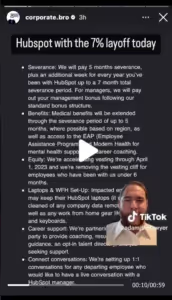
Adam Juratovac is a California employment lawyer from the Bay Area. He uses his TikTok account, which has 591.6K followers, to educate his users about employment law violations and his cases and talk about public layoffs.He balances his content about work and his personal life. So, he showcases local businesses, posts about his garden, or even post dancing videos (we stan).Additionally, Adam uses his platform to promote his community and special events, such as the AANHPI Heritage Event and San Jose Bar Association happy hours.
4Cierra Norris, aka @attorneycierranorris

Cierra Norris, a criminal defense attorney in Chicago, has found success leveraging TikTok as an outreach platform. Unlike most of the attorneys on this list, Cierra doesn't often post original sound videos–meaning, she isn't necessarily talking to the camera. Instead, she's a masterclass in using available sounds in combination with text and video, like lip-synchs and POV videos where she role-plays as though she's at court or talking to a prosecutor. Cierra also stitches with people posting foolishness with criminal admissions.She isn't afraid to have fun with the content while still providing informative and helpful tips for those seeking criminal defense assistance. This is an attorney who knows the platform and culture of TikTok really well. That's probably why she has 120.1K followers.
5Michael Pevney, aka @estateplanlawyer
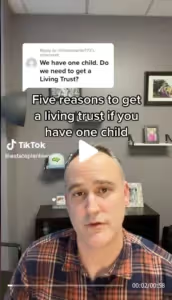
Michael Pevney, a California estate planning lawyer with 45.1K followers on his TikTok account. His account is all about helping people with estate planning needs. His content focuses on providing valuable tips and advice about living trusts and wills and breaking down any misconceptions about estate planning.Michael's account is all about being an authority on a subject matter. He engages with his audience by creating video answers for estate planning scenarios. His content is a bit more buttoned-up than most of the lawyers on this list which is exactly what his potential client demographic would want.
6Cristen Martinez, aka @cristen.martinez
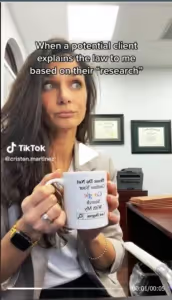
Making a difference and helping others learn from her background and expertise, Cristen Martinez of Martinez Law is determined to stand out in the real estate attorney world. With over 150.9K followers on her TikTok account, she shares vlogs documenting her daily life as a lawyer, from going to court to preparing for mediations. Providing general advice on real estate matters and legal topics, Cristen engages her viewers with highly informative videos such as playing with trending sounds, creating POV content and responding to comments with helpful advice.
7Mike Mandell, aka @LawByMike
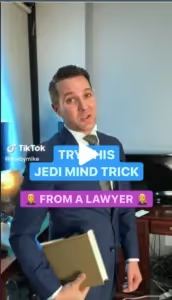
Mike Mandell has become the face of legal content on social media with his clever takes on everything from class action notices to why lottery winners lose all their money. Mike has a ton of videos, and they often strike a balance between totally unhinged and helpful (and we mean that in the best way).
With over 7 million followers, Mike strikes an entertaining yet informative balance between hilarious stories about 'the most litigious man on earth' and genuine advice for navigating interrogations and mastering the art of negotiation. His content is also highly produced, spiced up with trending sounds and hashtags that help reach a broad audience. Mike's videos provide people with many helpful tips but also offer skits that include teachable lessons from a unique perspective, giving it an edge that could explain his massive success on social media.
8Kelly Chang, aka @lawyerkelly

Kelly Chang is a lawyer specializing in divorce, and her TikTok account reflects that focus. Her content goes beyond just giving advice and "family war stories" and educational skits on how to ask for things in relationships. She also posts cute dog videos. Do not underestimate the power of leveraging your adorable pets.
Kelly helps her followers with prenup agreements, general marriage advice, and how to talk to kids about divorce. Through her videos, she conveys a passion for helping people with life transitions, and it's no wonder she has over 386.8K followers so far!
9Erika Kullberg, aka @erikakullberg

Erika Kullberg is perhaps the best-known legal TIkToker of them all, having invented a trend that takes companies' contractual loopholes to school. Her videos follow a very specific format where she records herself talking to employees and then turns directly to the camera with a whisper, "they have no idea I follow Erika," before showing them the fine print and providing an empowering message for her viewers.
Through her content, Erika has garnered a following of 9 million engaged fans who enjoy her ability to pick corporate apart while advising on consumerism. Thus making her one of the most popular TikTokers in the world.
Honorable Mention: Alex Su, aka @LegalTechBro

So you aren't a regular lawyer, you're a cool lawyer (like corporate, or in-house, or not practicing and now in sales for a tech company), and you think TikTok doesn't apply to you? Well, let's look at the wild success of Alex Su.
His account is geared toward lawyers and in-house legal departments. However, no list of lawyers on TikTok would be complete without mentioning Alex Su. He's the king of legal memes and has become incredibly popular for his skits about lawyers and legal departments. His account currently has 100.7K Followers. For anyone looking for a masterclass in creating hilarious, niche content- Alex's account is an absolute must.
Stop scrolling and start filming
Lawyers use TikTok to go beyond traditional advertising, creating entertaining, informative, and inspiring content. From advising on divorce proceedings to participating in dance challenges – these lawyers are showing the world how powerful social media can be for building relationships with clients and generating business.
By developing a presence on TikTok, lawyers can readily gain leads and opportunities for new clients. However, it is important to have a CRM system like Lawmatics that can effectively manage all these new leads, so they don't get lost in the shuffle.

Register for upcoming Monthly Deep Dives here.
No matter the size of your team, Tasks have the power to transform your process flow from clunky and manual to streamlined and automated. In Lawmatics, a Task is exactly what it sounds like: it is a to-do item pertaining to a particular matter that can be assigned to yourself or any other user in your organization. Every Task is created with a status, a due date, and a priority level.Tasks are useful for your whole team to help keep matter priorities and action items organized at all times. When Tasks are well-implemented, they help ensure that nothing slips through the cracks and that all clients have a flawless experience with your firm. Not only will this lead to happier clients and more referrals, but your team will also be happier and more efficient.From Custom Task Statuses, to automated Task Templates, to Automation Triggers based on Tasks, Lawmatics has all of the tools to keep your whole team organized and in the loop.
Tasks Overview
Creating Tasks
There are multiple different ways to go about creating Tasks in Lawmatics. In the next section we will cover how to assign tasks automatically, but first let’s focus on the manual way to create Tasks.Navigate to the Tasks Dashboard by hovering over the CRM tab in the top left, and then select Tasks. Here you will see a clear overview of all of your firm’s Tasks along with filtering options to view Tasks by status, due date, user, etc. You can also toggle between the traditional list view and the Kanban view using the buttons highlighted in red below.
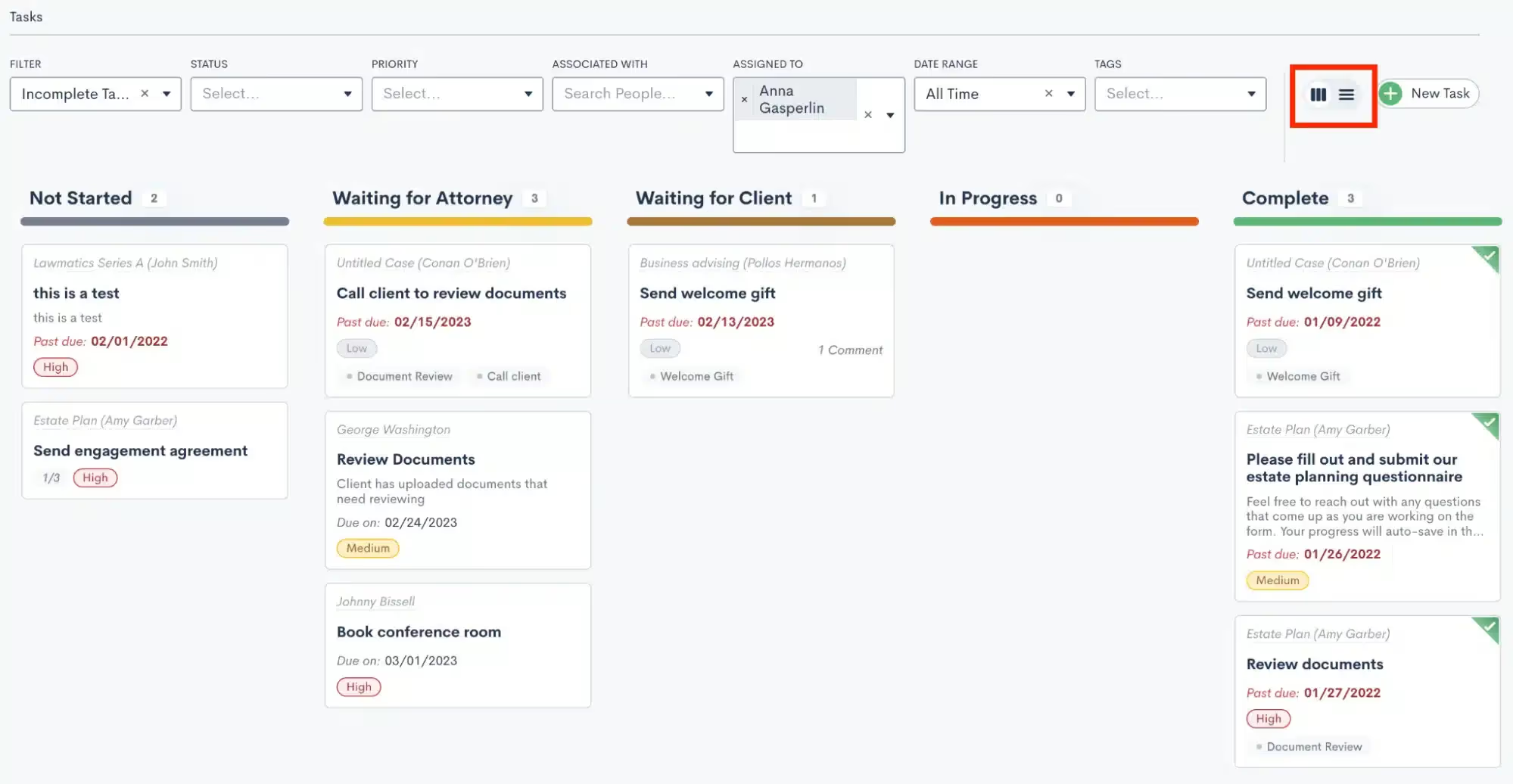
Of course in addition to viewing your Tasks, you can also create new Tasks here on this dashboard. To get started, click the New Task button in the top right corner. You will then see a new pop up that looks similar to the example shown below.
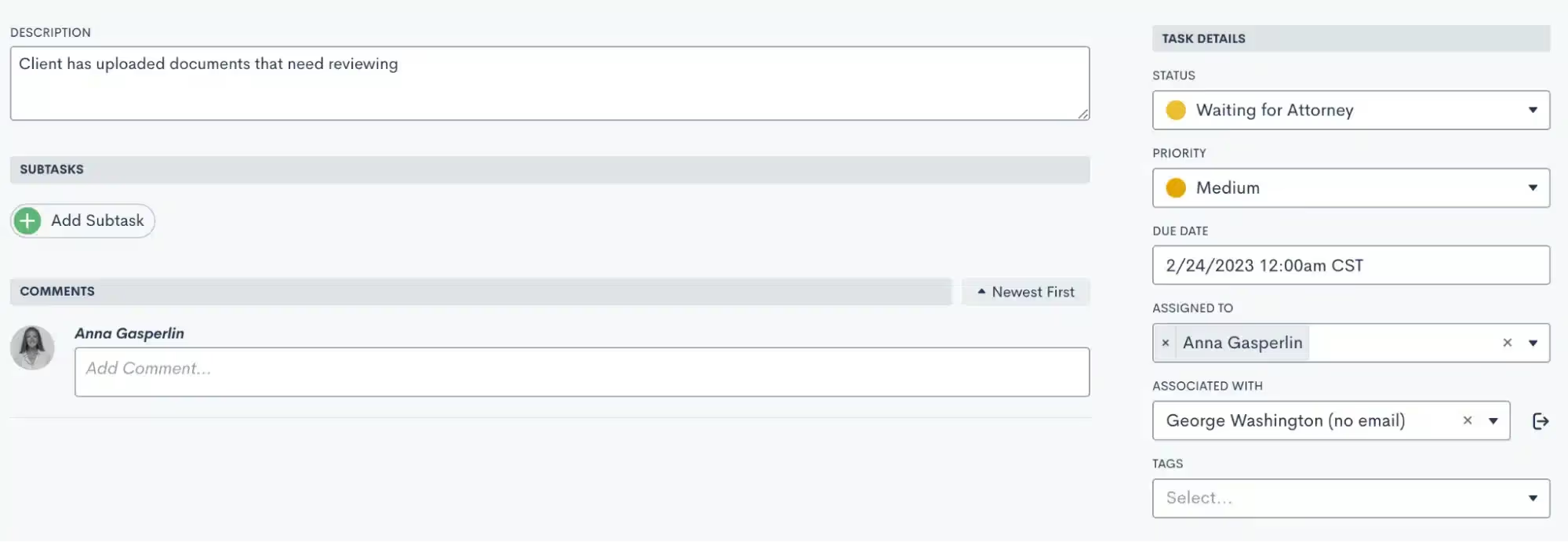
When creating the Task, make sure you give the task a name and a description, as well as the important Task details on the right sidebar menu. Also make sure to select which matter this Task is associated with when creating a task here from the dashboard.Another way to create Tasks is directly from a matter’s profile. When creating a Task this way, you will not need to select an associated matter since it will default to the current matter. Other than that, your steps for creating the Task will be the same as shown above.Simply select either the Tasks tab or the New Task button from the tasks sidebar on the matter’s profile.
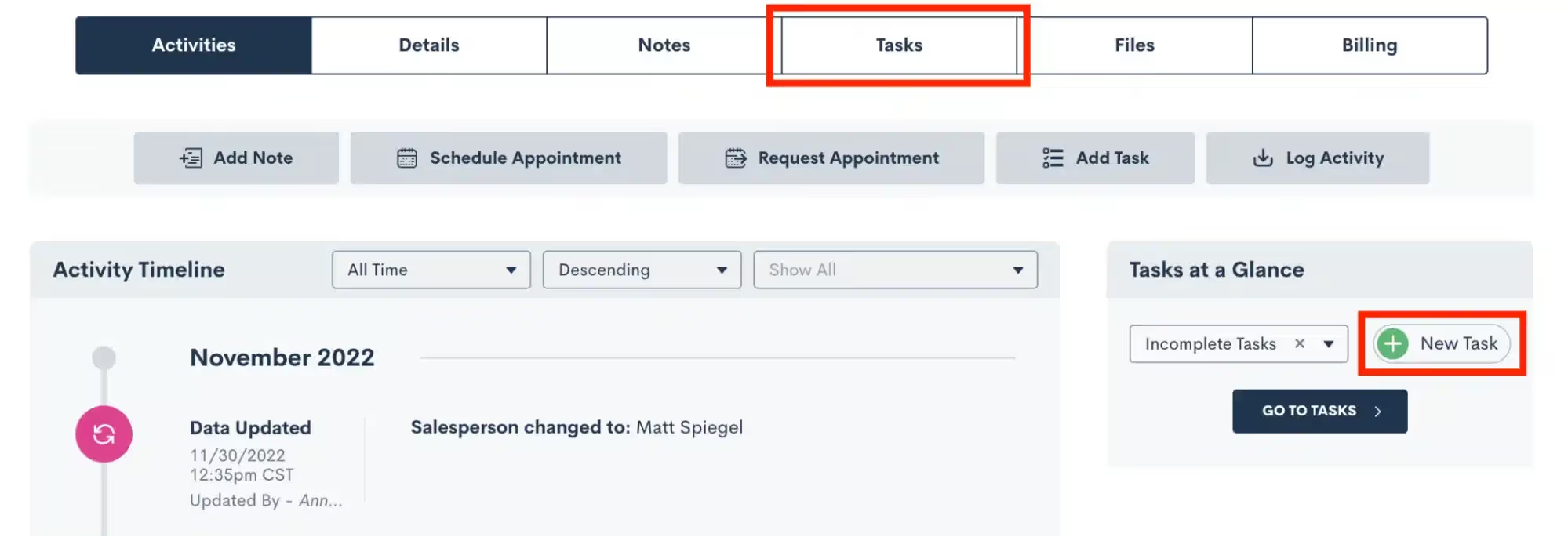
Custom Task Statuses
Whether you are new to Lawmatics or just starting to dive into the Tasks feature, you’ll want to make sure you have your Custom Task Statuses set up. These are created in your settings page (gear icon near the top right), and then select Tasks on the left sidebar.Your Task statuses are custom to your firm, and are created by clicking the Add Task Status button shown at the bottom of the image below. You will also see below some sample Task Statuses that may be used for your firm. Once you have created Statuses, use the icons on the far right to edit or delete a Status as needed. Also drag and drop Statuses to rearrange their order.
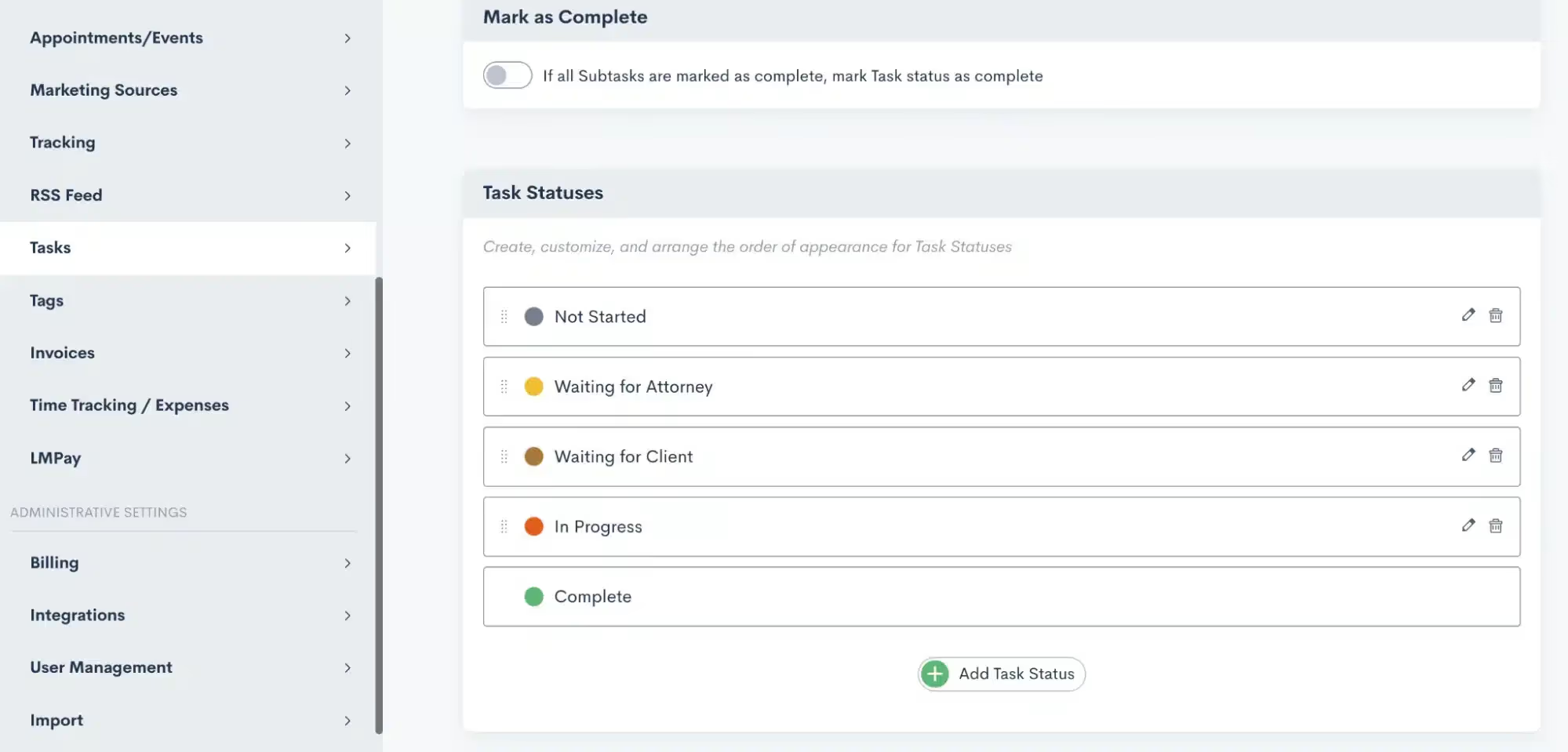
If viewing the tasks dashboard with the Kanban view, each of these statuses will be the column headers. The Kanban view allows you to easily drag and drop tasks between statuses. When creating a task, you will be prompted to select the current status of that task.
Task Tags
Task Tags are used purely for automation purposes; they allow you to trigger Automations when a particular Task is either created or completed. We’ll dive more into the automation piece in the following section, but for now we’ll discuss how to create your Task Tags.First, you can always create and edit or delete Tags by going to Settings, and then selecting Tags from the left sidebar. Note that you will also see your Contact and Matter Tags here too.You can also create a new task tag while creating a task itself. Simply start typing the Tag (as shown below) and then select to create the new Tag as an option.
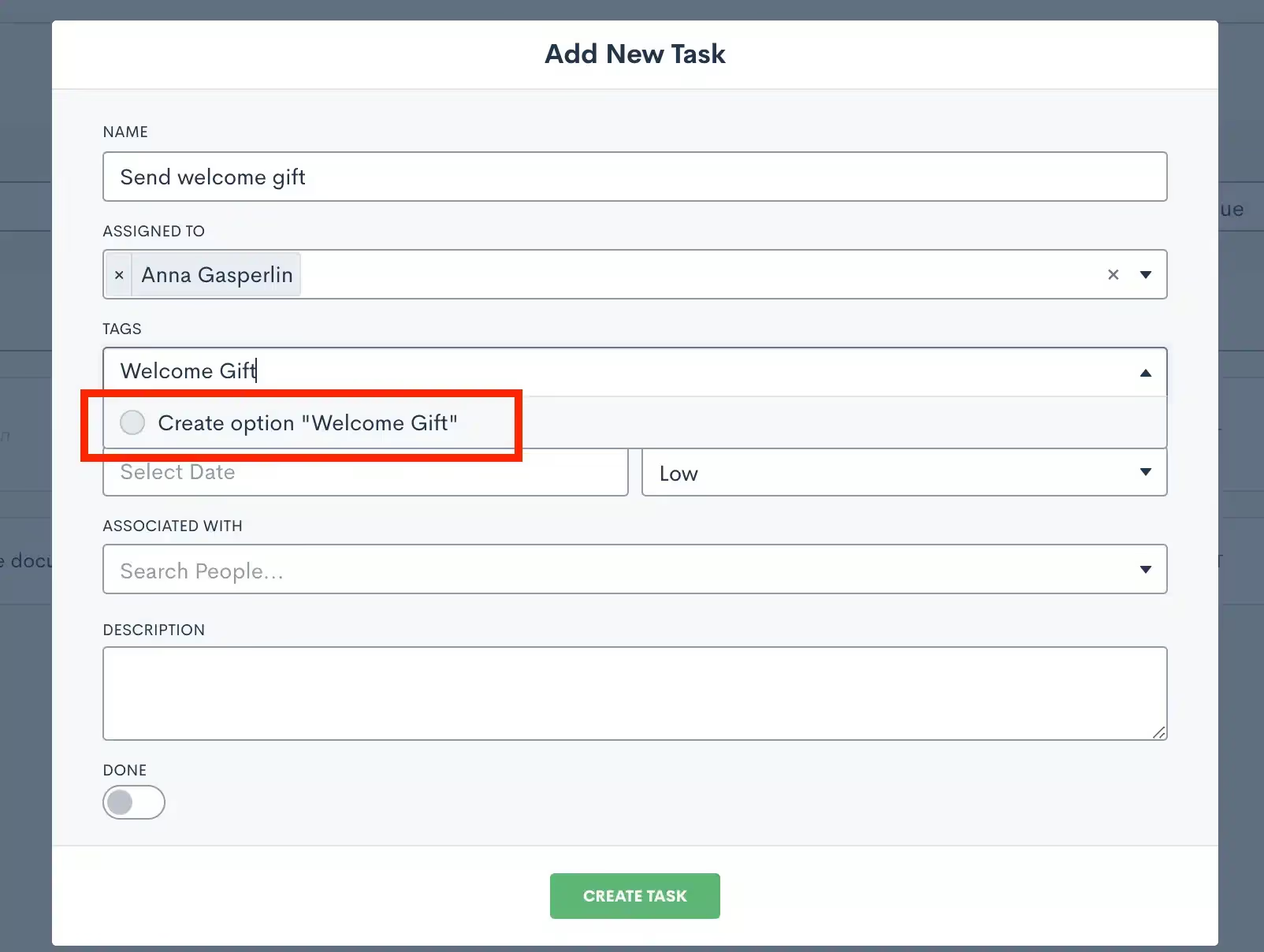
Editing and Completing Tasks
Last but not least in our Task overview, note that you can make edits to your Tasks at any time either from the Tasks Dashboard or from the associated Matter’s profile. You can also delete a Task in either of these places or mark a Task as complete.
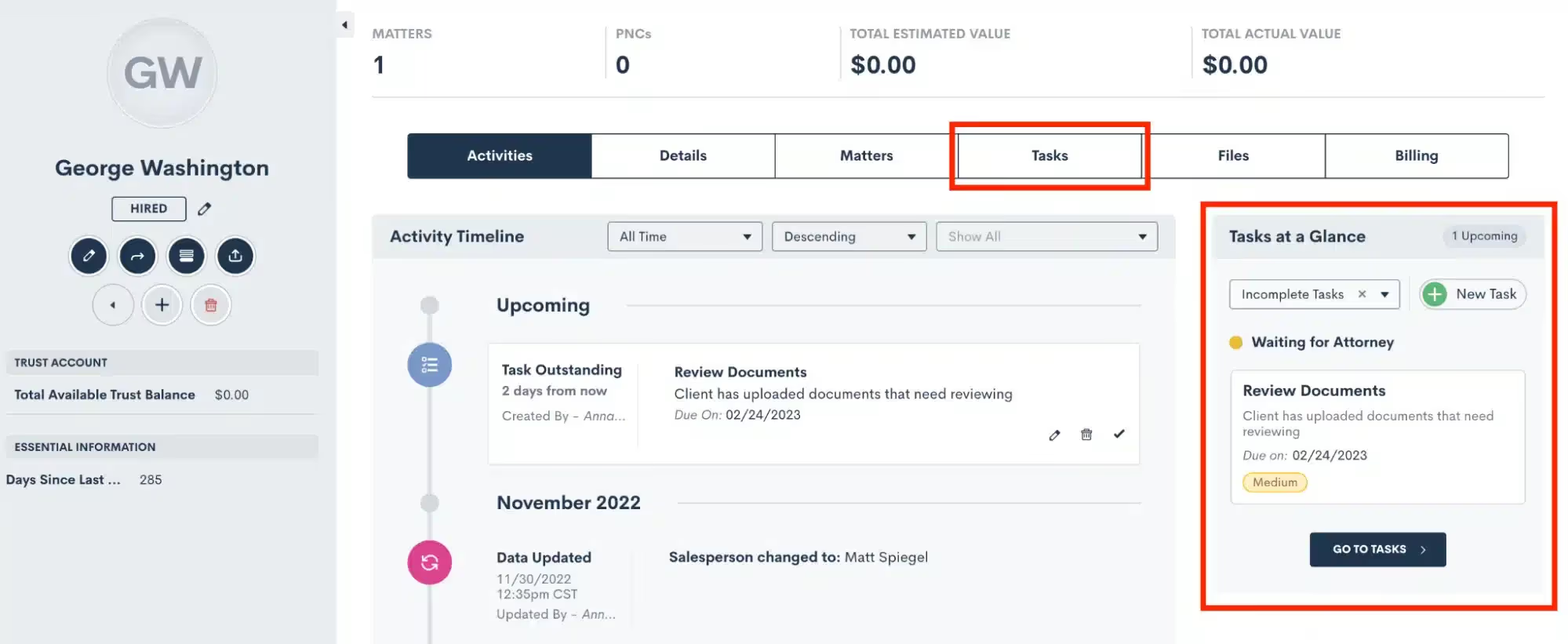
In the image above you’ll see that you can easily access a Matter’s Tasks from either the Tasks Tab, or the Tasks at a glance sidebar. Simply click on the task in the Tasks sidebar to edit, mark as complete, comment, etc.
Task Automation
Entry Conditions
The first way to use Tasks in Automations is to trigger one with a Task. Automations can be triggered based on Task Tags, discussed above. You also have the option to trigger the Automation based on a Task of a specific Tag being either created or completed.

Note that you can use this entry condition along with any of our other entry conditions to create either an AND or an OR conditional relationship with multiple entry conditions.It can often be powerful for your firm to trigger an Automation when a Task is completed. This may kick off another Task to be assigned automatically, or any other step that may come next in your process.
Tasks as an Action Item
Speaking of assigning Tasks automatically, this is easily accomplished by using the Add Task action item. When this item is selected in an Automation, you will make the same selections on the right sidebar that you would make when manually creating a Task.

This includes the Task name, due date, Task owner etc. While there may sometimes be a use-case for manually creating tasks as a one-off, we strongly recommend using Task automation whenever possible. This is a great way to reduce spent time on tedious Task creation, and streamline each step in your process as a template.Typically Tasks are used to assign action items to users within your firm, but Tasks can also be shared directly to a Client’s Portal via automation. We’ll dive into this deeper in our power features section below.
Examples
Now that you know the basics of Task automation, let’s discuss a few examples of how you may use this in your process.
- Trigger an Automation when a client submits a Form or uploads Documents, automatically assign a Task to review what has been submitted
- When a client is ready to receive a fee agreement, trigger a Task for the appropriate staff person to preview and send the document out for e-signature. For full automation, template your Document thoroughly and avoid the step of previewing the Document and simply send it directly from the Automation.
- Are there any manual steps in your process that must be done physically outside of your CRM? Use Lawmatics to trigger a templated sequence of Tasks helping to ensure that these items are all accomplished in a timely manner.
Task Power Features
Tasks are extremely useful to your practice no matter how you go about implementing them into Lawmatics. All of the elements of Tasks discussed so far are fantastic ways to use them in your process. Take things to the next level by adding in some (or all!) of these Task power features.
Comments
An exciting new feature, Lawmatics now gives users the ability to comment on Tasks. The system will automatically keep track of the date and time of the comment, along with which user left the comment.

To leave a comment, simply click on a Task (or click the edit button). Here you will also see the comment thread history of the Task.To level up your comments one step further, you can also use the @ sign to alert a particular user within your comment.
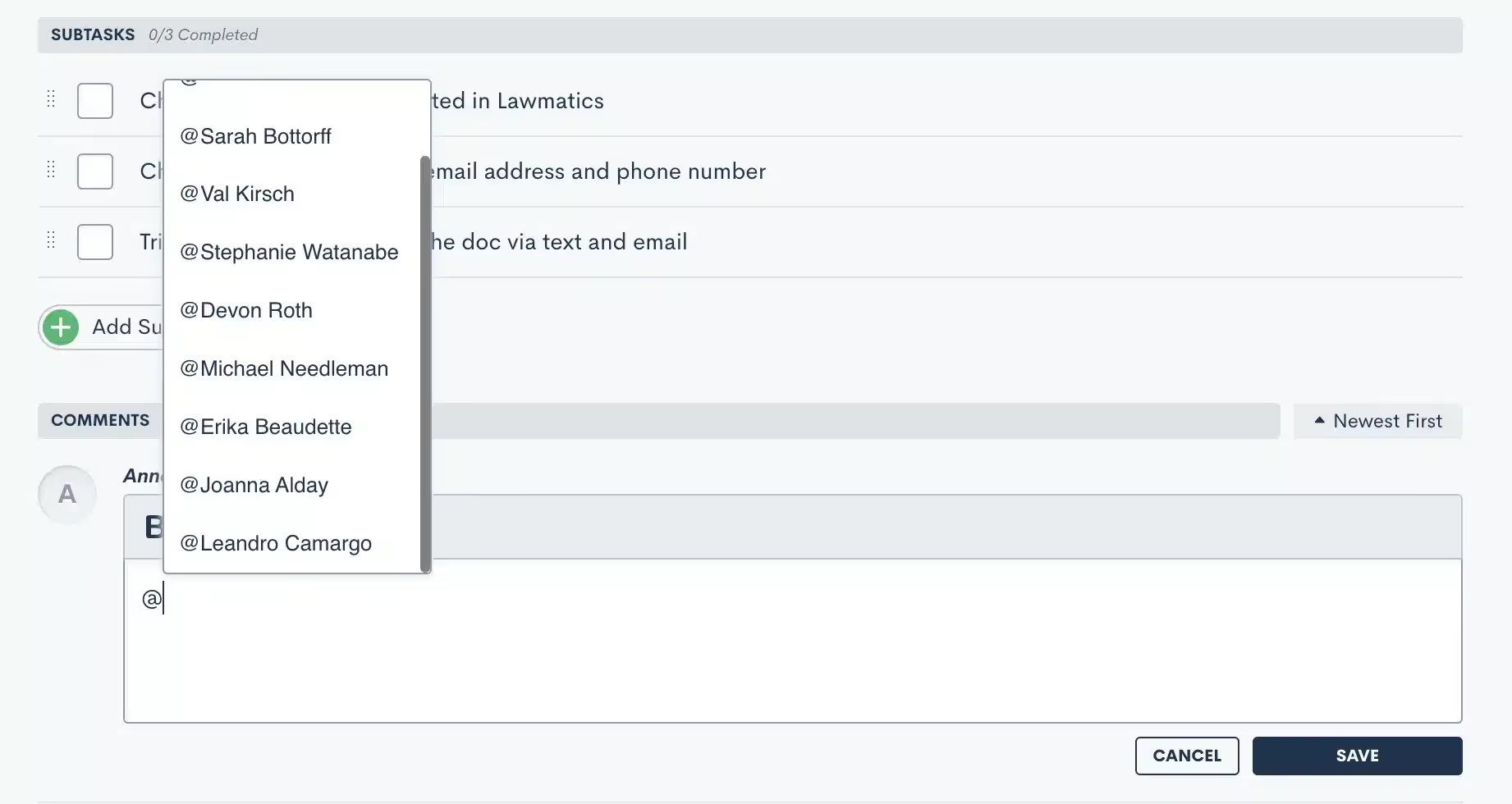
Task Notifications
To make sure you and your staff never miss any important Task comments or notifications, we encourage all Lawmatics users to turn on their Task notifications. We are also excited to share some new task notifications along with these new power features.To turn on notifications, each individual user will navigate to settings, and then select Notifications from the left side menu. Scroll down to locate the Tasks section.

Sub Tasks
When creating a Task, Lawmatics now gives you the ability to create Sub Tasks within the Task. You will notice the Add Sub Task button any time you are adding a new task, either from the dashboard or a matter’s profile.

These Sub Tasks can be marked as completed independently of one another, as well as of the Task as a whole. Once all sub tasks have been marked as completed, then the Task will automatically be marked as completed as well.
Client Portal
The Client Portal is a powerful tool for sharing Forms, Documents, Appointments, and of course Tasks with your clients. For any Tasks that you wish to assign directly to the client themselves, or to another related matter contact, you can share Tasks via Client Portal.This can be done directly from a matter’s profile, as shown below, or when creating a task via automation. Make sure that the client has first been given portal access using the button highlighted in red near the top left before selecting to share a task with them.

When a client logs in to their Client Portal, they will see a similar page to the one shown below. They can easily view the Tasks you’ve shared with them right in their Client Portal dashboard.
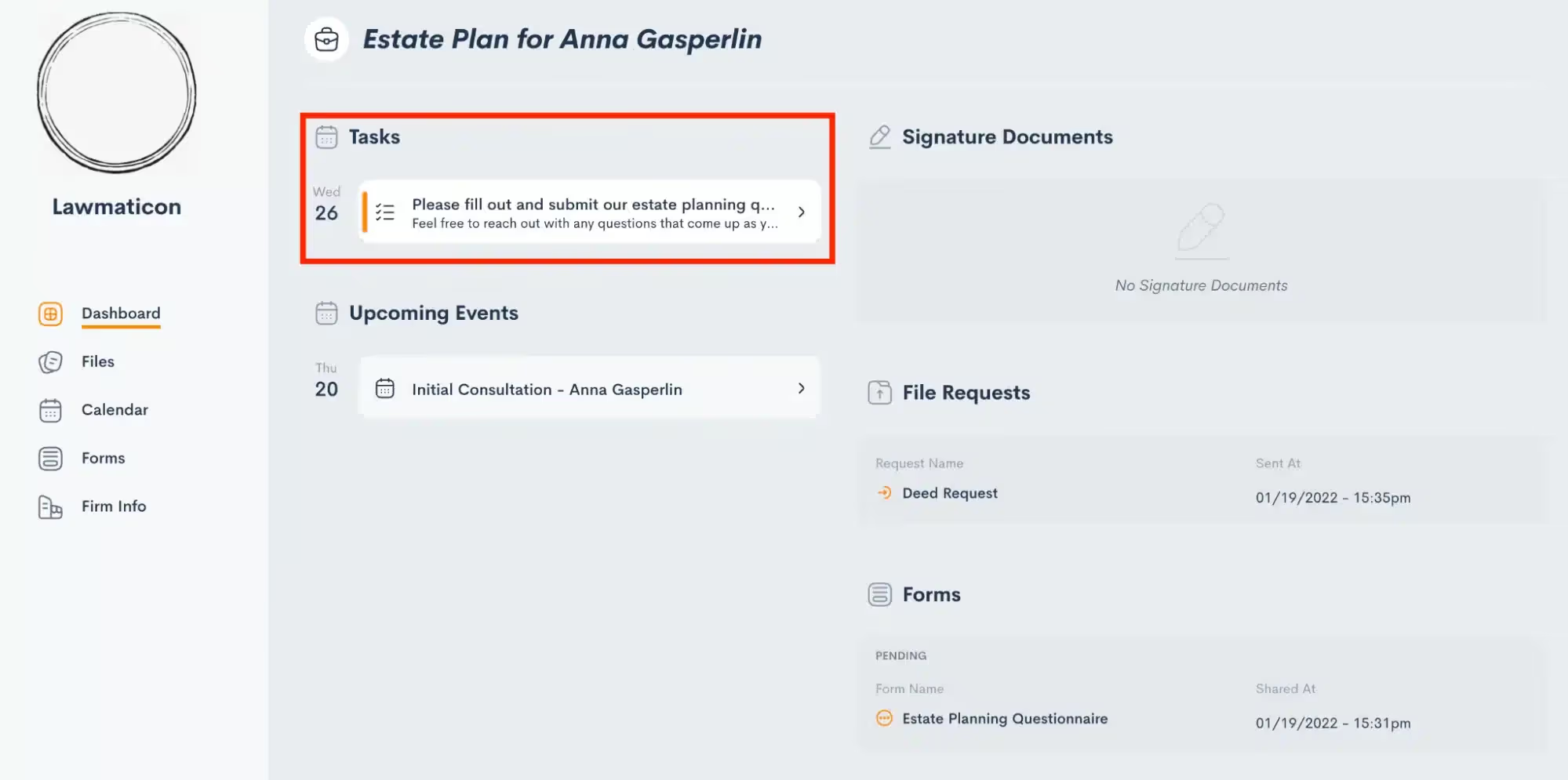
Conclusion
Lawmatics gives you the power to streamline your entire client journey, so why shouldn’t that apply to your internal process as well? Tasks are the key to increased productivity, efficiency, and hopefully happiness within your organization.Lawmatics tasks allow your team to spend more time on their actual work, and less on the behind the scenes setup and organization of their process. They can simply create their task templates once, and then find them automatically assigned each time they need them.
What does CRM stand for?
For any legal professionals asking themselves if CRM is a word, the answer is simple, really. CRM is a commonly used acronym in the business world that stands for "Customer Relationship Management." In the context of the legal industry, an attorney CRM software refers to software used by law firms to manage and analyze customer interactions and data throughout the customer lifecycle. This includes marketing automation, contact management, sales management, and client intake. The goal of using a CRM in the legal industry is to improve customer engagement, streamline processes, and increase sales and profitability. Let’s dive into the meaning and purpose of the three letters that have become a staple in the legal industry lexicon.
What is a CRM and how does it work in the legal field?
Law firms have to manage a large volume of client data, and keeping track of all this information manually can be a time-consuming and error-prone process. Enter legal CRM software. A CRM system helps law firms to manage this data in a centralized and organized manner, making it easy for them to access and use it to improve their customer engagement and business processes.Using this software, the customer relationship management process in the legal industry involves the following steps:
- Marketing Automation: CRMs help law firms to generate leads by automating their marketing campaigns, such as social media marketing, and tracking their effectiveness. This enables law firms to attract and reach out to potential clients in order to convert them into customers.
- Contact Management: CRMs help law firms to manage their contact information, including client information, leads, and customer interactions. This makes it easy for law firms to keep track of their customers and reach out to them when needed.
- Sales Management: CRMs help law firms to manage their sales pipeline, including the tracking of opportunities, quotes, and sales activities. This enables law firms to close deals faster and improve their sales performance.
- Client Intake: CRMs help law firms conduct efficient and effective client intake by automating intake forms, document requests, and organizing client information for future engagement.
What is the importance of a CRM in the legal industry?
The role of customer relationship management (CRM) in the legal industry is more than just about keeping track of clients and their cases. With the right CRM system in place, law firms can achieve a number of important business goals. The importance of customer relationship management lies in its ability to help firms become more efficient and ultimately grow their business. By using CRM, law firms can better understand their clients' needs, provide white glove customer service, increase sales and profitability, and even predict future business trends. The end result is increased customer satisfaction and a more successful and profitable law firm.But it’s not enough for law firms to procure a generic CRM. Legal specific CRM provides a centralized platform designed to meet the unique needs and requirements of the legal industry — one of which is client intake.
How does a CRM help law firms with client intake?
The client intake process is one of the most critical steps in the legal industry, as it sets the foundation for a successful client relationship. By automating and streamlining the client intake process, law firms can improve their customer engagement and increase their overall efficiency. Here's how CRM can help law firms handle the client intake process:
- Automating client intake forms: CRM software allows law firms to automate client intake forms, making the process faster and more efficient. With digital forms, clients can complete the intake process from anywhere and at any time, eliminating the need for manual processing and reducing the risk of errors.
- Organizing client information: CRM software helps law firms organize client information in a centralized database, making it easier to access and manage. This central repository of client data can be used to track client interactions, monitor progress, and make informed decisions about future engagement.
- Tracking client interactions: CRM software allows law firms to track client interactions, from initial contact to final resolution. This data helps law firms understand their clients' needs and preferences, allowing them to provide better customer service and increase customer satisfaction.
- Improving communication with clients: CRM software provides a platform for law firms to communicate with clients in a more organized and effective manner. With tools such as email and text messaging, law firms can keep clients informed and engaged, improving customer loyalty and retention.
What are the CRM software options for law firms?
There are limited CRM software options available for law firms, including free and paid options. Lawmatics is among the best CRM for law firms. Lawmatics is a CRM specifically designed for the legal industry and offers a range of features, including lead generation, contact management, sales management, customer service, and technical support. Lawmatics legal CRM elevates the client experience with automated processes, customizable digital intake forms, email workflows, advanced custom fields, document request templates, e-signature capability, and more. To learn more about how Lawmatics can help your firm’s process run smoothly, request a demo today.
Most of today’s consumers base their buying decisions on stars – meaning they value five-star reviews as much as personal recommendations by friends and relatives. Online client reviews have also become a determining factor for many legal clients when narrowing down their choice of law firms. For lawyers and most businesses, the main reason for advertising on a review site is to get exposure. Recent statistics revealed that in 2021, 77% of consumers “always” or “regularly read online reviews when browsing local businesses (an increase from 60% in 2020). Just three percent of those surveyed said they would consider using a company with an average rating of two or fewer stars, down from 14% in 2020. Lawyer review sites give lawyers and firms visibility and provide the impression that they are credible and reliable. However, not all lawyer review sites are created equal. Some are free, others require a monthly payment, and still others allow lawyers to obtain a simple listing for a fee but require payment for previous spots and additional features. Here is a list of some of the review sites frequented by legal consumers and how firms can leverage these review sites to grow their organization (and potentially track them as a marketing source):
1 Avvo
Founded over 15 years ago by former Expedia lawyer Mark Britton, Avvo is an attorney review site that provides consumers with legal advice (thanks to its vast resource library) and helps them find attorneys via lawyer profiles, peer endorsements, and reviews of U.S.-based lawyers. Avvo, whose name comes from avvocato (the Italian word for lawyer), is a neutral platform, meaning that attorneys cannot pay to improve their ratings or conceal negative information about themselves. The site uses an algorithm to calculate a rating for each attorney – the more favorable an attorney’s background, the higher the rating will be.
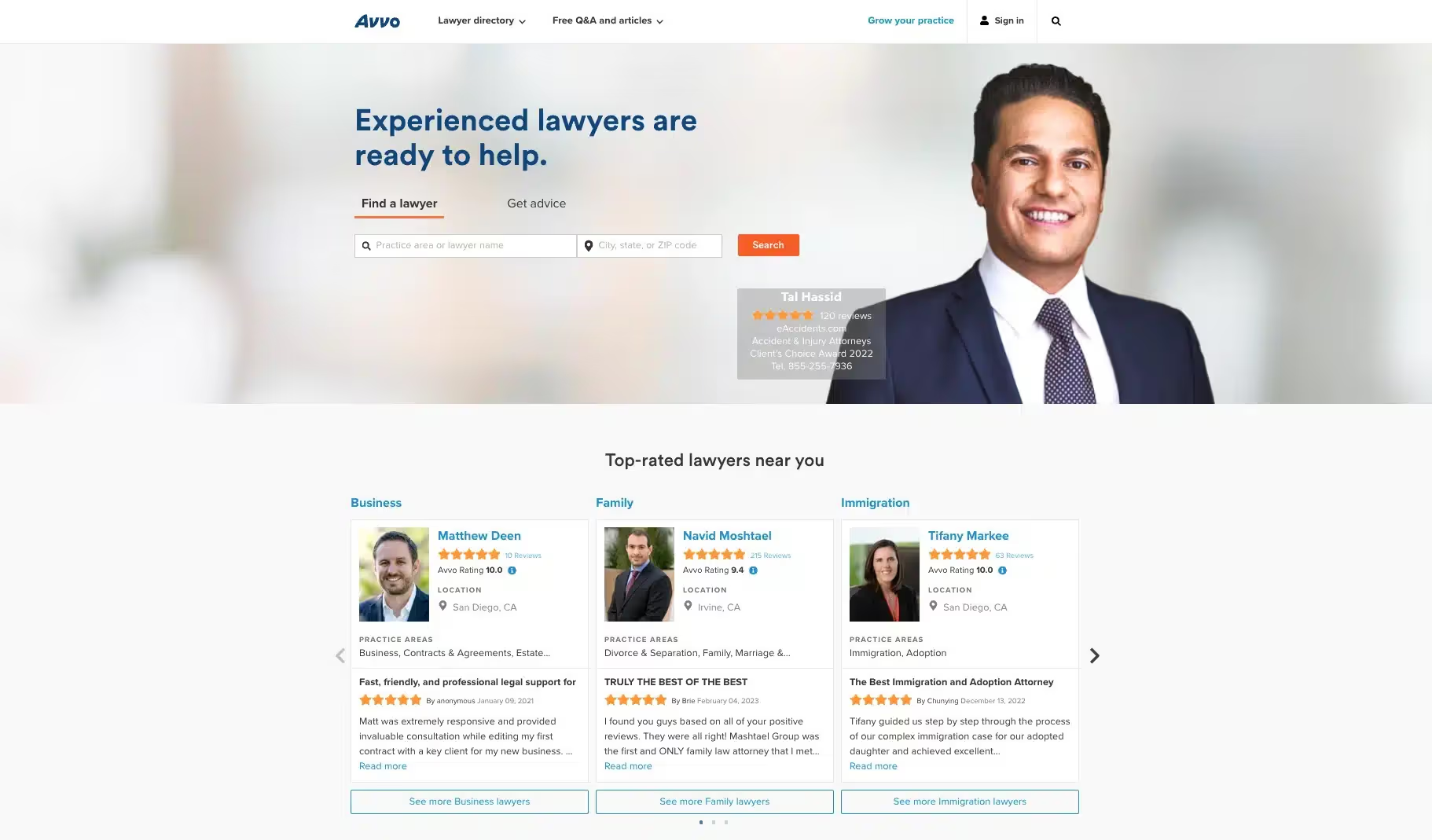
How to leverage Avvo: When you claim your Avvo profile, you can post critical information about your firm, including your rates. You can also monitor your reviews and overall rating and become a thought leader in your area by answering questions in the Q&A forum.
2 FindLaw.com
FindLaw.com is a free legal information site that helps consumers find answers to legal questions and search for attorneys. The site includes case law, state and federal statutes, a lawyer directory, legal news and analysis, and Writ, a free legal dictionary and magazine where legal academics explain and debate legal matters of interest. Star ratings on FindLaw’s attorney directory represent an average of all the ratings submitted for an attorney or law firm. Optional ratings like value, quality of service, and professional competence do not influence the attorney or firm’s overall rating. Clients can leave one review per attorney and one review per firm on FindLaw, and if they have worked with multiple lawyers and firms, they can leave one review per attorney and firm. Client reviews cannot be edited once submitted, but an original review can be deleted and a new one offered in its place.
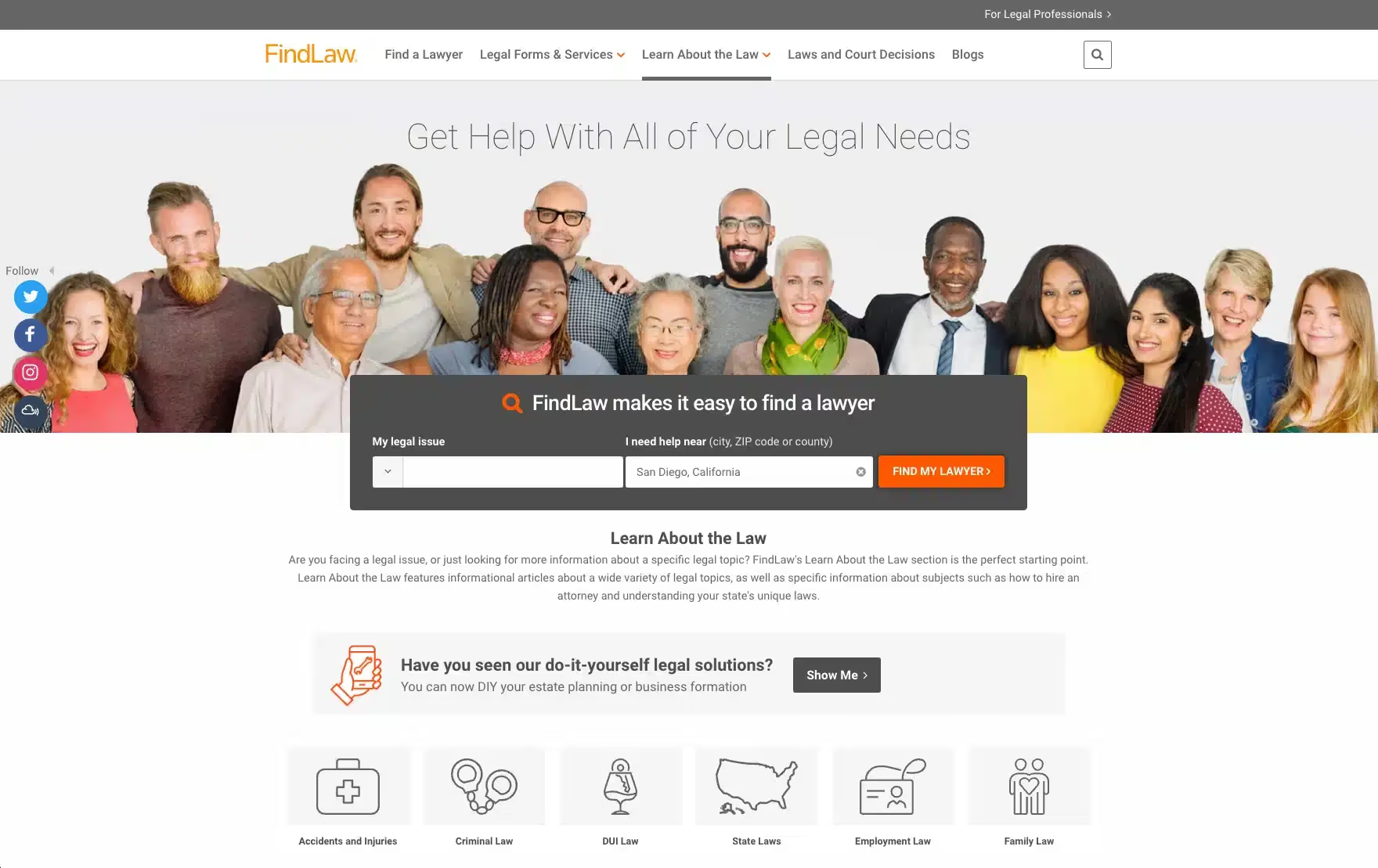
How to leverage FindLaw: Not surprisingly, many consumers use Google to search for legal services, and with the use of target keywords, FindLaw profiles frequently appear high in Google’s organic search results. Because FindLaw consistently ranks high on Google and consumers are likely to click on one of the first results they see, lawyers need to have a profile and reviews on the platform – many users refine their FindLaw search to include only profiles that include reviews.
3 Lawyers.com
Lawyers.com is a free service for legal consumers who need representation but aren't sure how to begin. In addition to profiles for over one million attorneys worldwide, Lawyers.com includes informational articles on numerous legal topics. It operates as an online source providing consumers and small business professionals with the information they need to learn about the law, ask questions, get answers, and find the right legal team for their issues. Lawyers.com also does paid listings, provides dofollow links back to law firm websites, and offers more than 700,000 keyword rankings that positively impact organic search results.
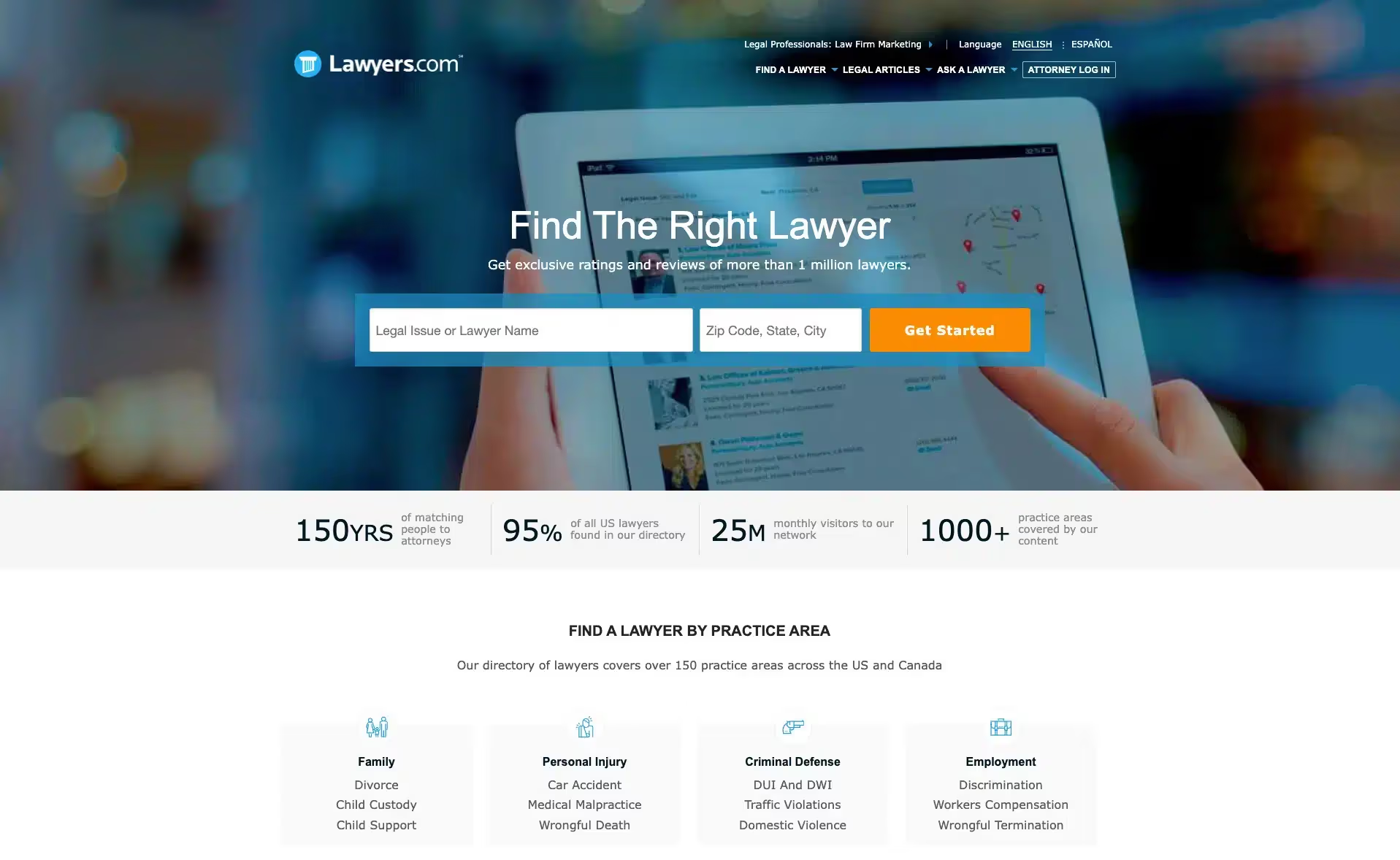
How to leverage Lawyers.com: Lawyers.com enables potential clients to contact attorneys directly from the website via a form, which makes it an excellent way for lawyers to attract and convert leads. Because Lawyers.com is a top-ranking legal website, lawyers must maintain a compelling profile that accurately describes their practice.
4 LegalMatch
LegalMatch is a client-attorney matching service focused on connecting clients with the right lawyers, based on the client’s legal issue and the lawyer’s location and area of practice. To help them find the right attorney on LegalMatch, clients are asked to answer specific questions. For example, after clients choose a category and location, the platform asks them to select a subcategory, respond to a series of issue-specific questions, describe the legal issue, and provide their contact information. Once the case is submitted, LegalMatch lawyers will respond to the request, share their background, outline fees, and explain why they feel qualified to assist with the matter. LegalMatch also has an attorney mobile app (iOs or Android) that helps attorneys stay abreast of new leads anytime and anywhere.
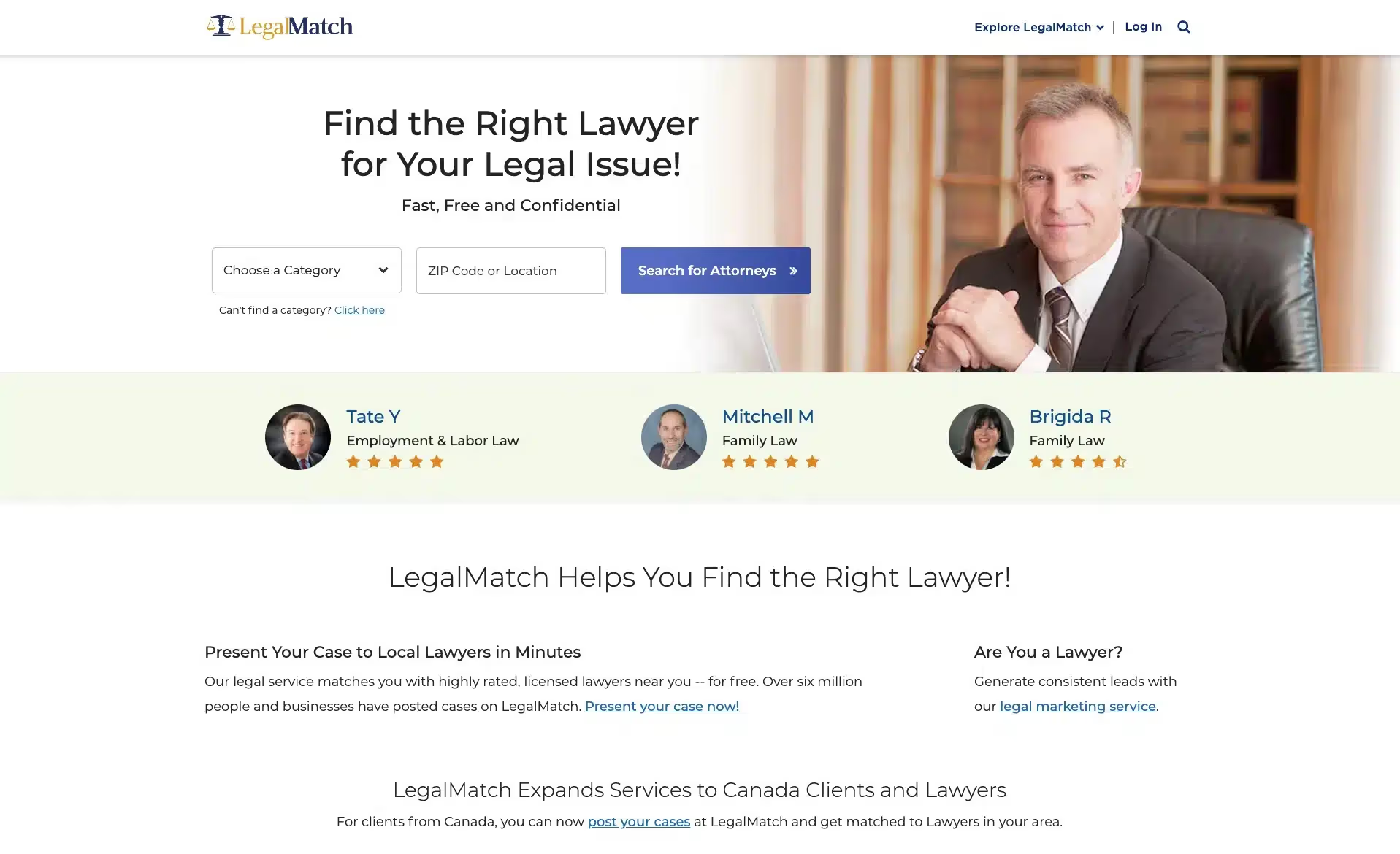
How to leverage LegalMatch: Lawyers on LegalMatch should customize their response templates according to inquiries, making one for each of your legal specialties. For example, a one-page response template describing areas of specialization and mentioning one or two successful cases will likely grab a potential client’s attention more thoroughly than a generic response sent to everyone. In addition, since prompt follow-ups often help convert clients, lawyers on LegalMatch should consider preparing a call script to facilitate quicker engagement and help streamline conversation.
5 Martindale-Hubbell
Martindale-Hubbell is a website that features a combination of peer review ratings and client reviews to give clients a complete picture of an attorney’s abilities. An indirect benefit of listing with Martindale-Hubbell is that since Martindale owns Lawyers.com, lawyers get listings on both platforms as well as links to individual attorney profiles included in the listing price. In addition, the platform has a comprehensive guide for attorneys who want input on creating a solid profile.
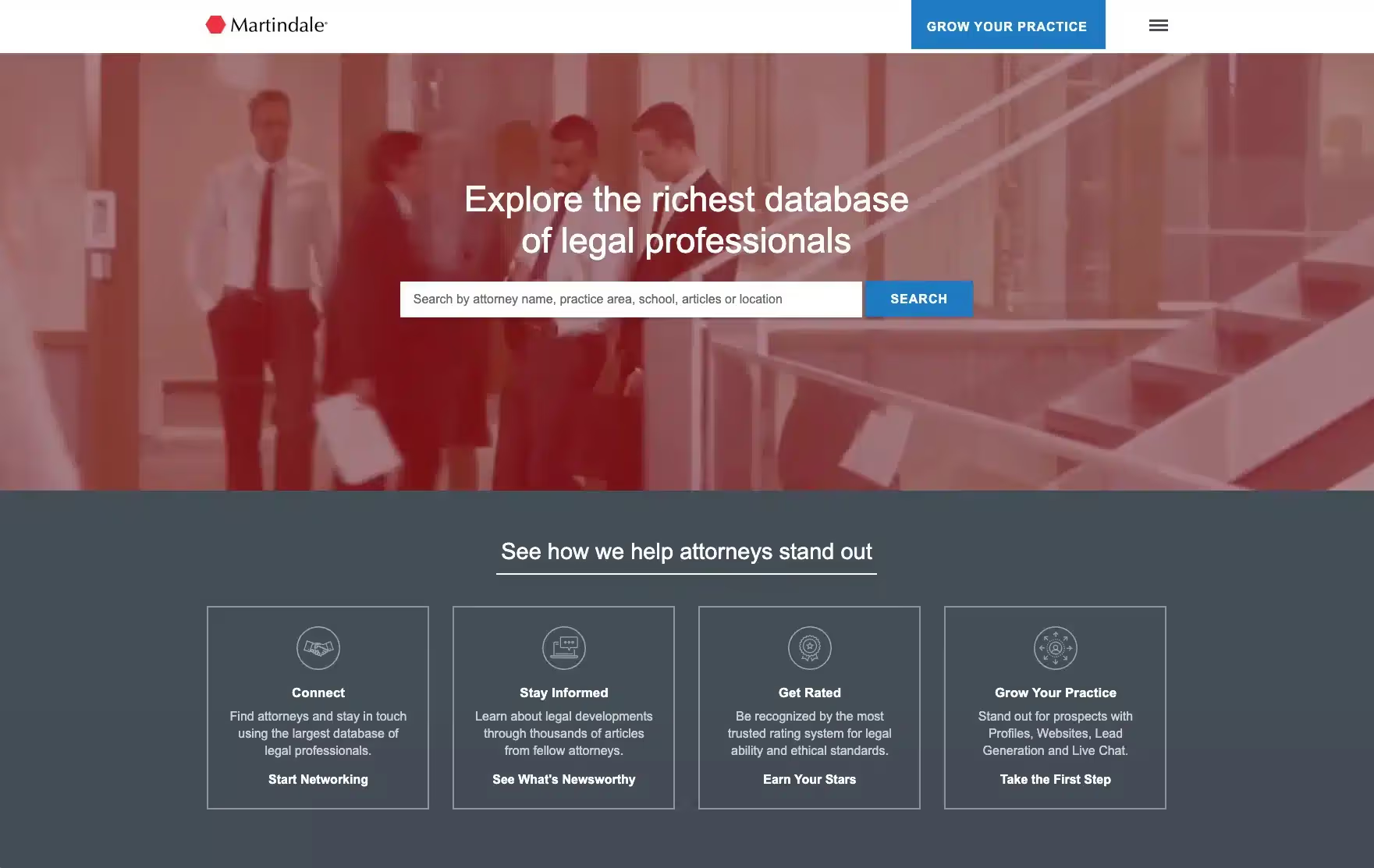
How to leverage Martindale-Hubbell: Lawyers who subscribe to Martindale-Hubbell can select up to two reviews with written feedback that will be displayed at the top of their client or peer review section, which gives them the ability to highlight what they want potential clients to see first.
6 Nolo
Nolo, a combination of some of the internet’s first legal sites – Nolo.com, Divorcenet.com, and AllLaw.com, is now Nolo Network, one of the internet’s largest libraries of free consumer-friendly legal information. Although Nolo provides consumers with information about handling certain legal matters themselves with do-it-yourself products, the Nolo lawyer directory connects potential clients with a list of attorneys competing for their business. They can also view lawyers individually and connect with whomever they choose. In addition, Nolo offers two subscription types: Profile, which includes a professional attorney profile, unlimited article publishing ability, direct leads, and flat fee pricing, and Premium, which provides all the features of Profile plus lead generation through Nolo’s network, premium positioning and exposure, and pricing based upon return on investment (ROI).
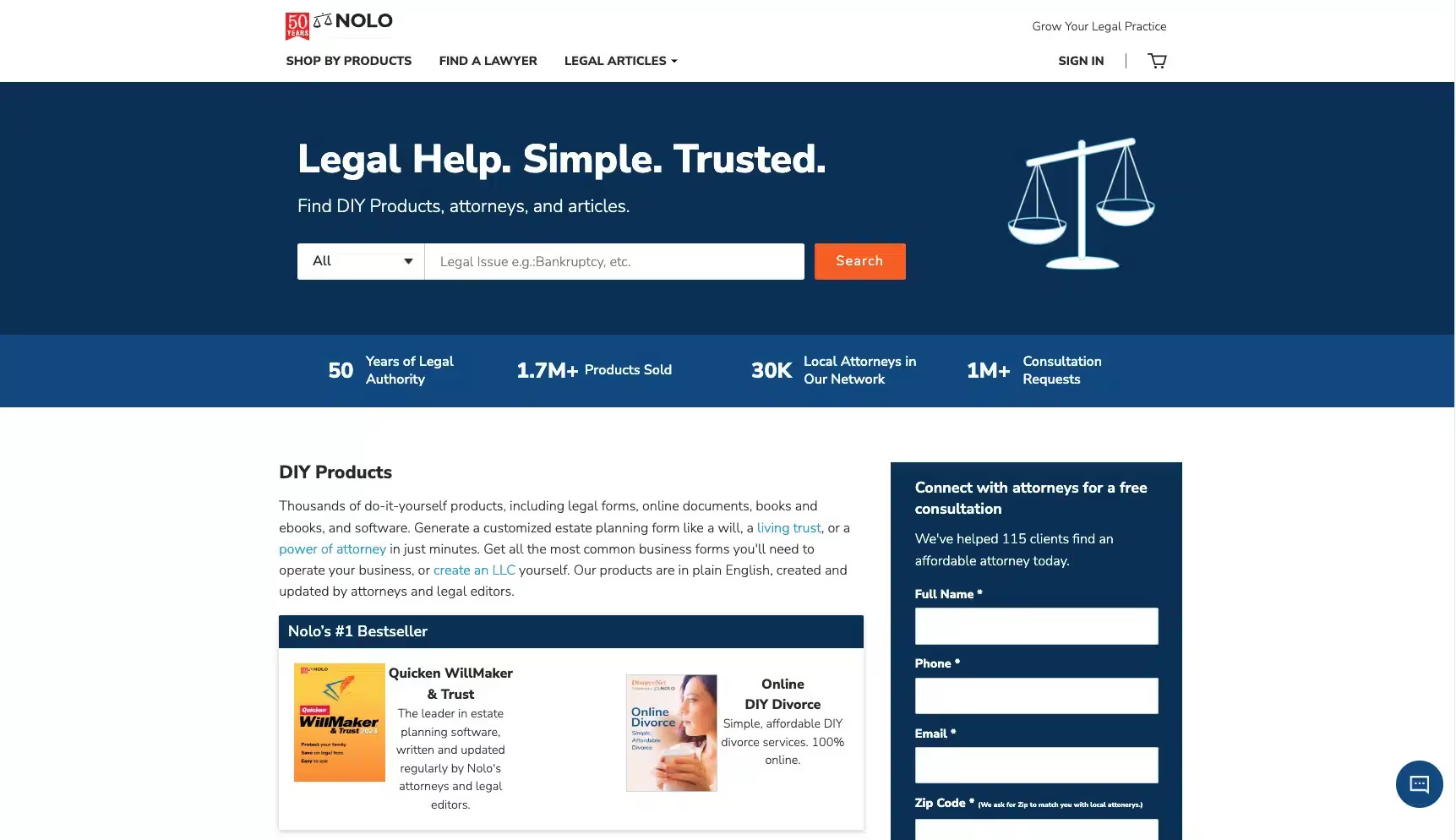
How to leverage Nolo: With over 100,000 lawyers listed on Nolo, lawyers and firms can use the site to boost their online visibility, generate leads, and drive referrals to their websites. Nolo provides lawyers with numerous marketing options, including real-time leads filtered based on location and practice area and powerful reporting that helps subscribers measure performance and ROI.
How to ask for client reviews the ethical way
All businesses that ask for reviews are held to general advertising laws; however, attorney advertising rules related to lawyer review sites are more specific. For example, while some companies offer gift cards or other incentives in exchange for reviews, the American Bar Association (ABA) updated rule 7.2 in 2018 to include specific language that limits what a lawyer can offer in exchange for a review.
Rule 7.2 provides in part:
(b) A lawyer shall not compensate, give or promise anything of value to a person for recommending the lawyer’s services except that a lawyer may:
(5) give nominal gifts as an expression of appreciation that are neither intended nor reasonably expected to be a form of compensation for recommending a lawyer’s services.
Best practices to stay in compliance
- No gifts. Avoid offering even a small gift in exchange for a review.
- Timing matters. While asking for reviews at the end of every email and in most communications is common practice for some businesses, attorneys should only ask for a review at the end of the case, regardless of the outcome.
- Be non-specific. Review requests should ask the client only to share their experience. Don’t request personal information your clients would not want widely known.
- Follow ABA ethics rules. ABA rules do not allow lawyers to edit reviews, meaning that whatever your client writes (positive or negative) must be published with no omissions.
Here are some ways to make asking for a client request as safe (and ethical) as possible for both your clients and your firm:
Make giving a review easy and convenient
Clients will be more inclined to review your work if you simplify the process. To do so, consider building review requests into the final client paperwork. Include a link on any concluding communications with clients and ask specifically for a review in any follow-up communications. You can also request reviews periodically on social media platforms and in automated email marketing communications. Attorneys are prohibited from actively soliciting reviews from individuals who are not yet clients.
Create a policy for managing client reviews
Law firms should treat client reviews as a part of firm culture. To do so, they should set up a system for managing client reviews and stick with it. Offer gratitude for the positive reviews and propose a follow-up for unhappy clients. Showing appreciation to clients for positive reviews and responding to less-than-satisfied clients demonstrates to potential clients that your firm remains engaged, even after a case concludes. You could designate a specific time every week to respond to attorney reviews or specify a particular team member to do so. You might consider using an attorney-client relationship management platform (commonly known as a legal CRM) to keep track of these responses.
Know how to advertise your client reviews
When an attorney publicizes client reviews, the ABA’s Model Rules of Professional Conduct clarify what is legal and what may be considered an unwanted solicitation. For example, you should never say, “Our clients think we’re the best!” or “Reviews show that we’re the experts!” Some states prohibit client reviews and testimonials entirely, noting that these are only personal experiences and could be misleading. To find out what’s permissible in your jurisdiction, check with your state bar’s rules on attorney reviews before posting any. Post a link on your website to featured lawyer review sites (if allowed), and consider adding a link to your social media profiles.
Increase client engagement (and drive positive reviews) with Lawmatics CRM
The Lawmatics client relationship management (CRM) system aims to help law firms manage and engage clients by keeping track of critical information about them. From knowing who their clients are, how they found out about their law firm, and whether anyone has followed up with them since they initially made contact – a legal CRM serves as the “brain” of a law practice, tracking each potential new client through their journey. All lawyers want to drive efficiency, attract more prospects, increase client engagement, and accelerate the growth of their firms. The ultimate purpose of a CRM is to manage the client intake process for attorneys by attracting, delighting, and retaining clients so lawyers can focus on what they do best – practice law. The result: more repeat business, positive reviews, increased client referrals, and a boost in law firm revenue. For more information on how the Lawmatics legal CRM can elevate your clients’ experience and accelerate your law firm’s growth, request your demo today.
Subscribe to get our best content in your inbox
Ready to grow your law firm with Lawmatics?
Schedule a demo of legal’s most trusted growth platform.
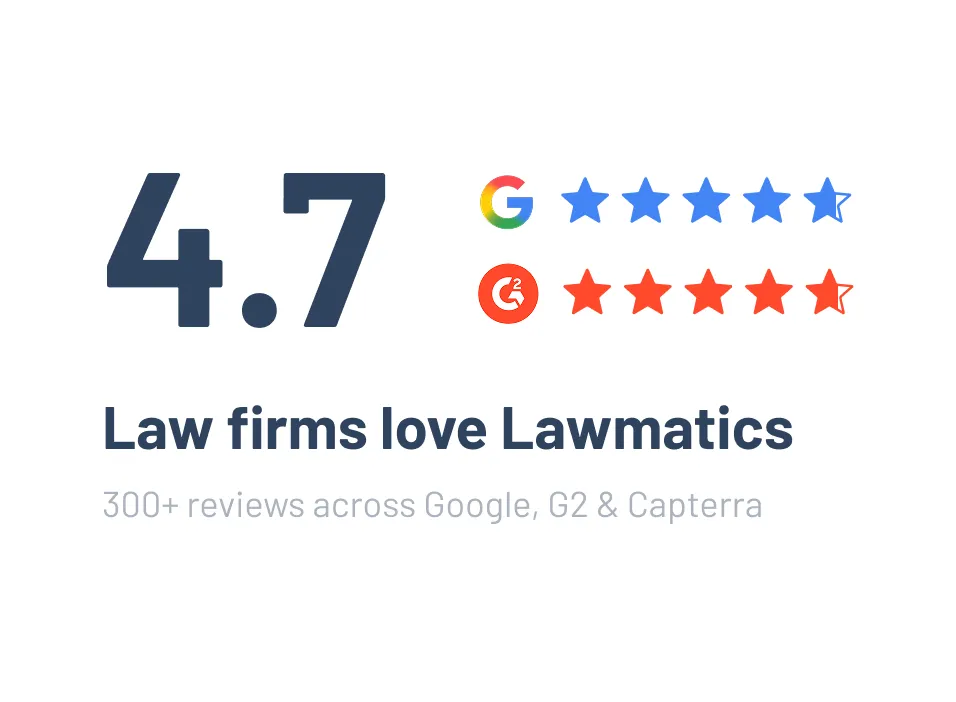




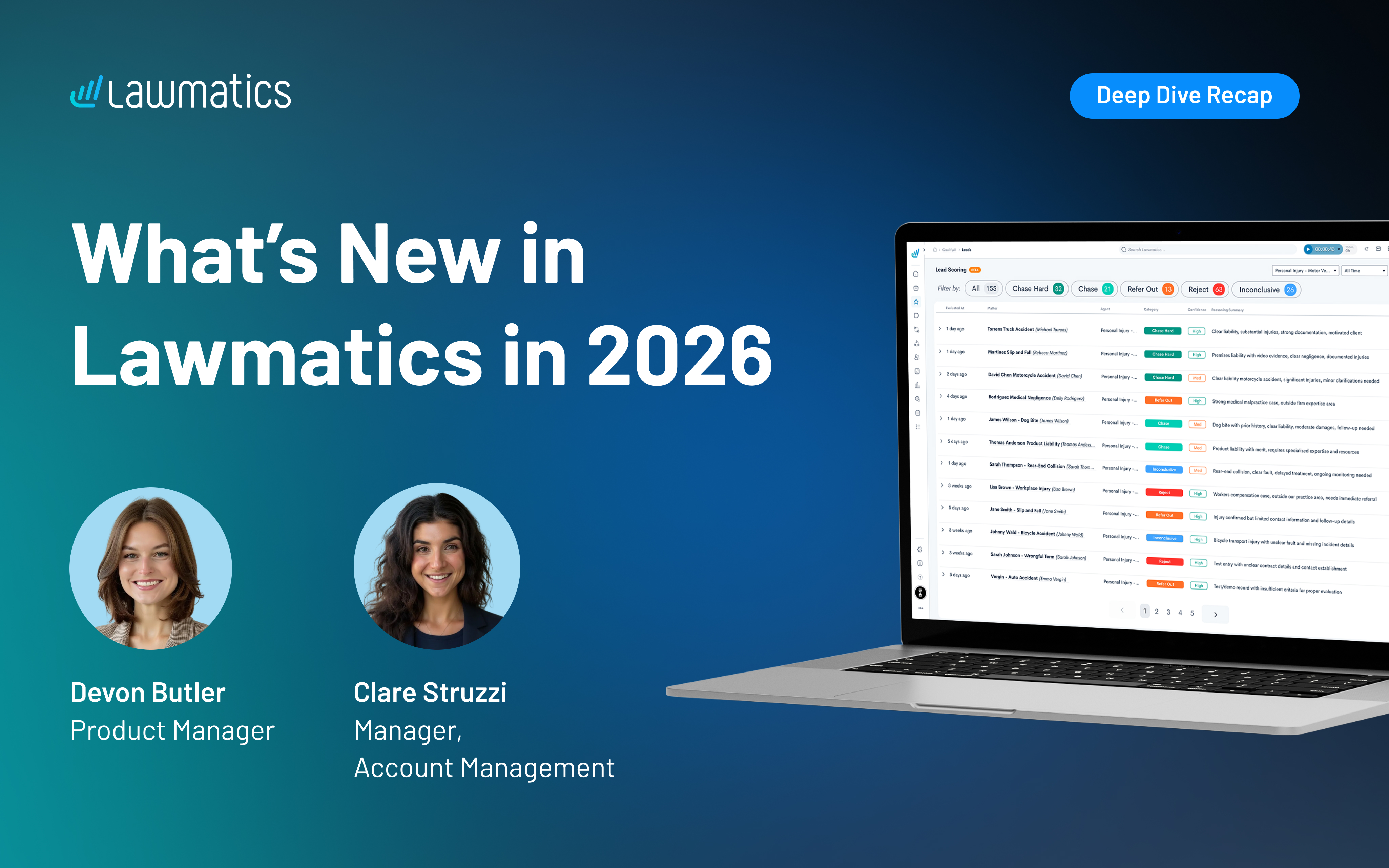




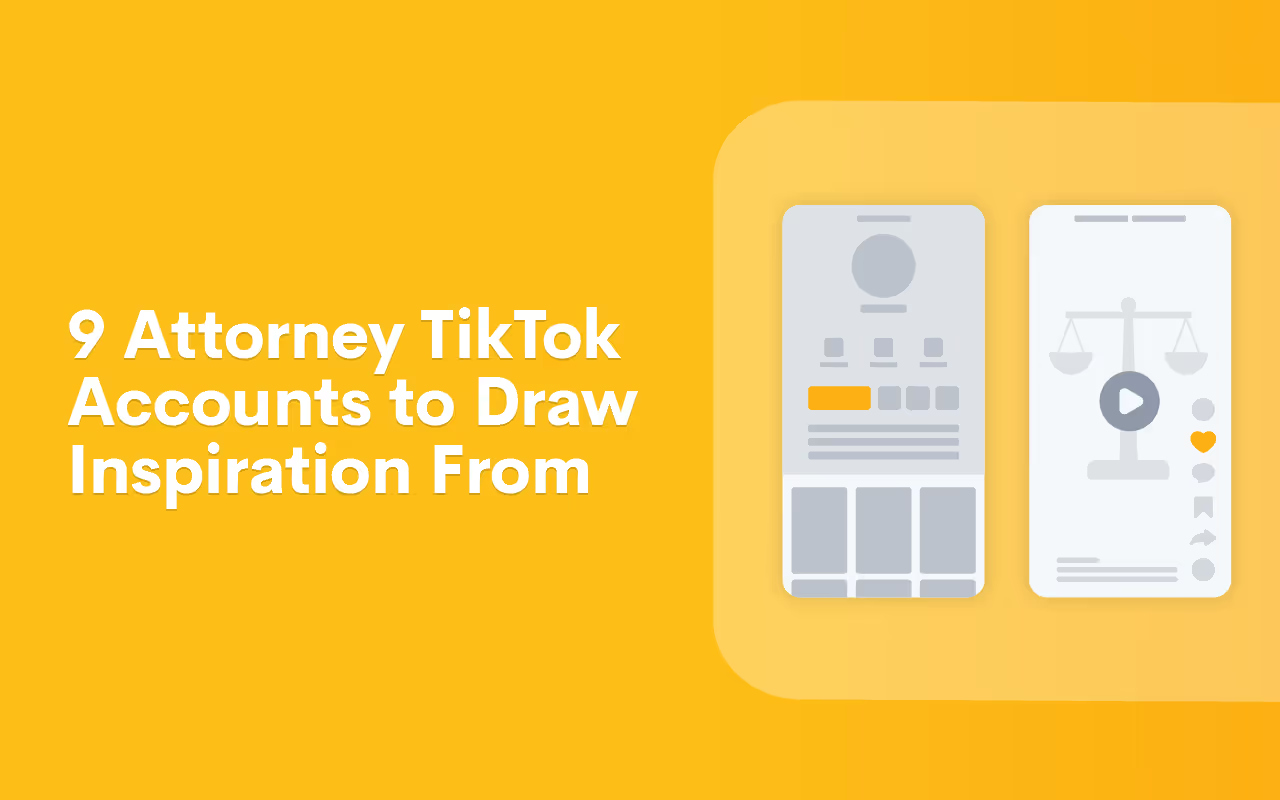

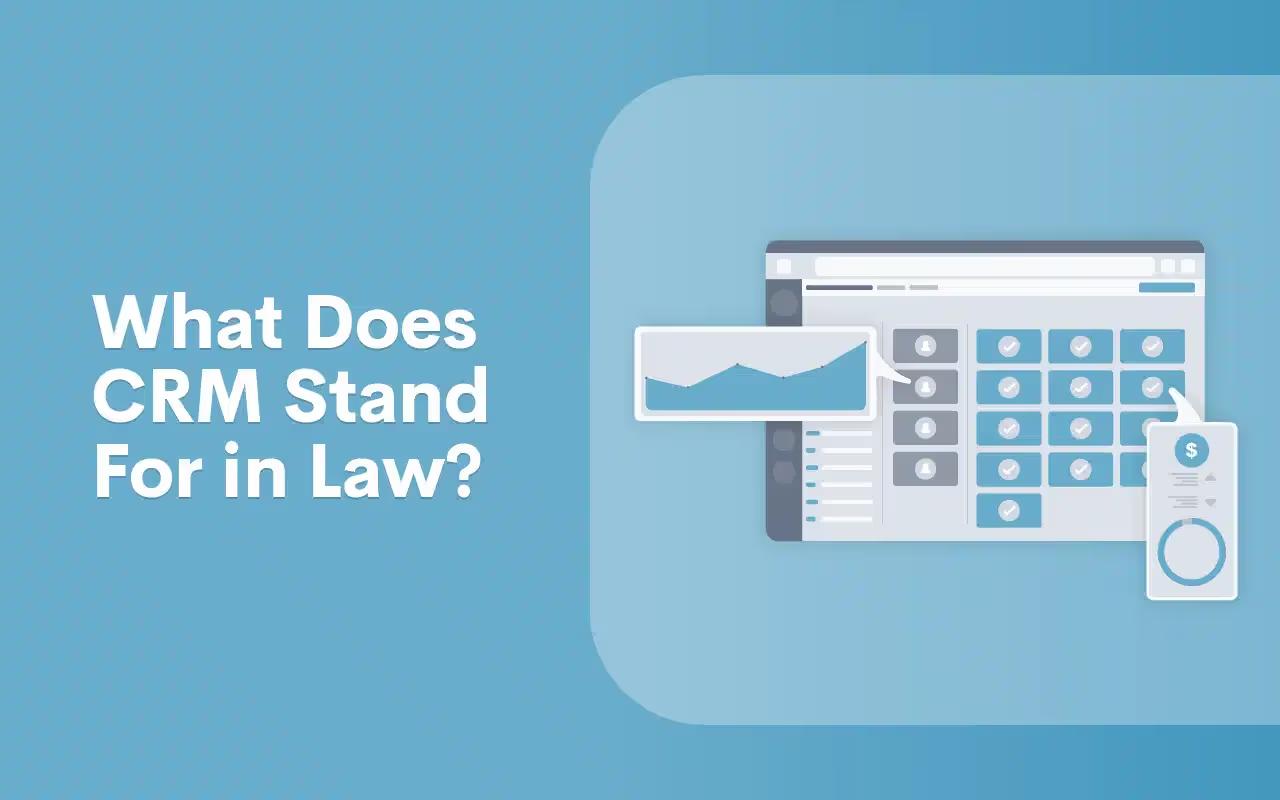

.avif)
.avif)

.avif)
